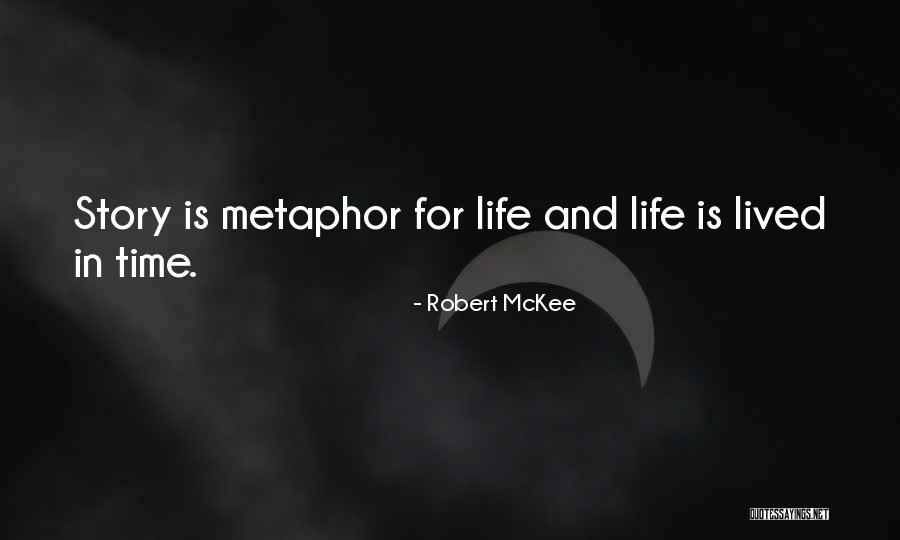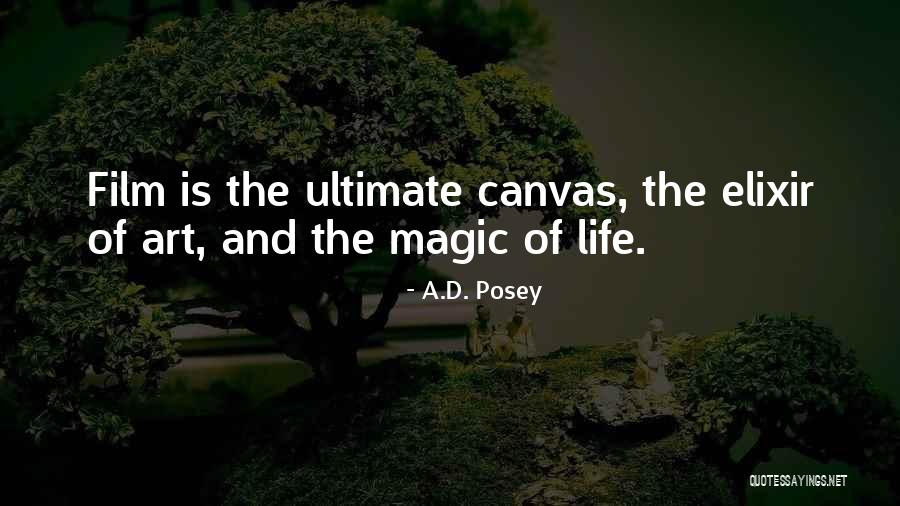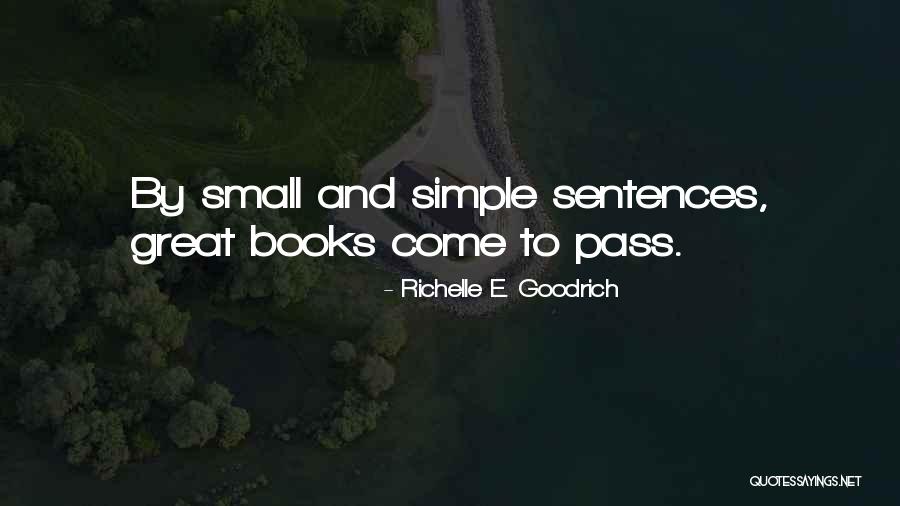Quotes & Sayings About Storytelling And Life
Enjoy reading and share 100 famous quotes about Storytelling And Life with everyone.
Top Storytelling And Life Quotes
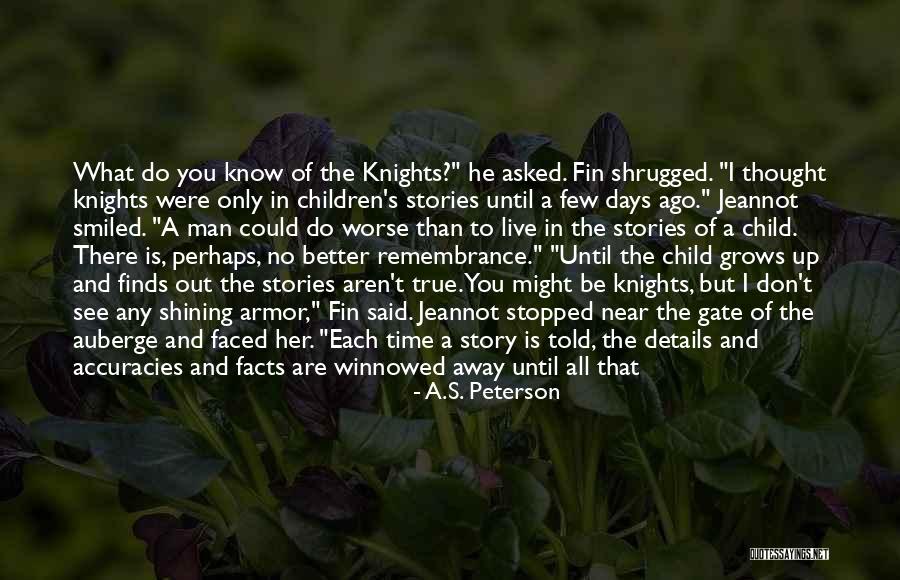
What do you know of the Knights?" he asked.
Fin shrugged. "I thought knights were only in children's stories until a few days ago."
Jeannot smiled. "A man could do worse than to live in the stories of a child. There is, perhaps, no better remembrance."
"Until the child grows up and finds out the stories aren't true. You might be knights, but I don't see any shining armor," Fin said.
Jeannot stopped near the gate of the auberge and faced her. "Each time a story is told, the details and accuracies and facts are winnowed away until all that remains is the heart of the tale. If there is truth at the heart of it, a tale may live forever. As a knight, there is no dragon to slay, no maiden to rescue, and no miraculous grail to uncover. A knight seeks the truth beneath these things, seeks the heart. We call this the corso. The path set before us. The race we must run. — A.S. Peterson
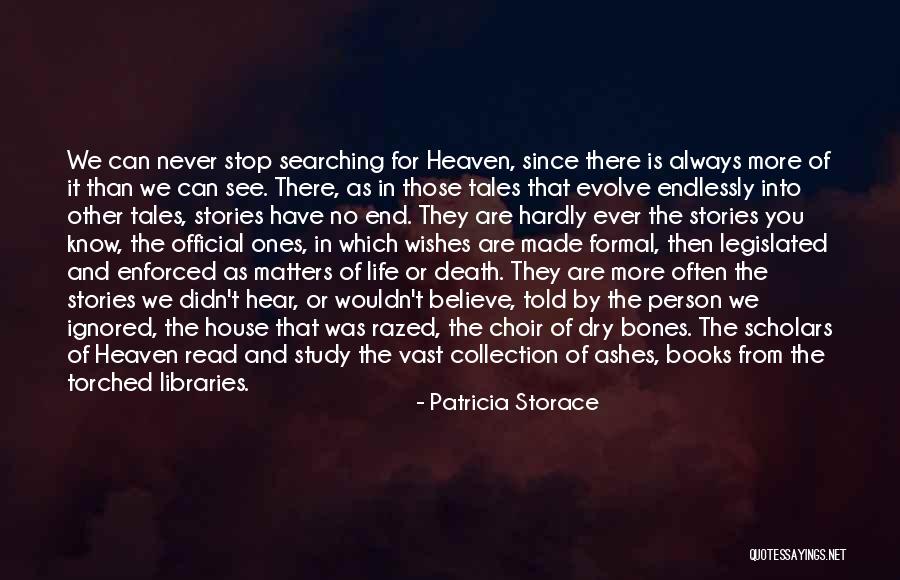
We can never stop searching for Heaven, since there is always more of it than we can see. There, as in those tales that evolve endlessly into other tales, stories have no end. They are hardly ever the stories you know, the official ones, in which wishes are made formal, then legislated and enforced as matters of life or death. They are more often the stories we didn't hear, or wouldn't believe, told by the person we ignored, the house that was razed, the choir of dry bones. The scholars of Heaven read and study the vast collection of ashes, books from the torched libraries. — Patricia Storace
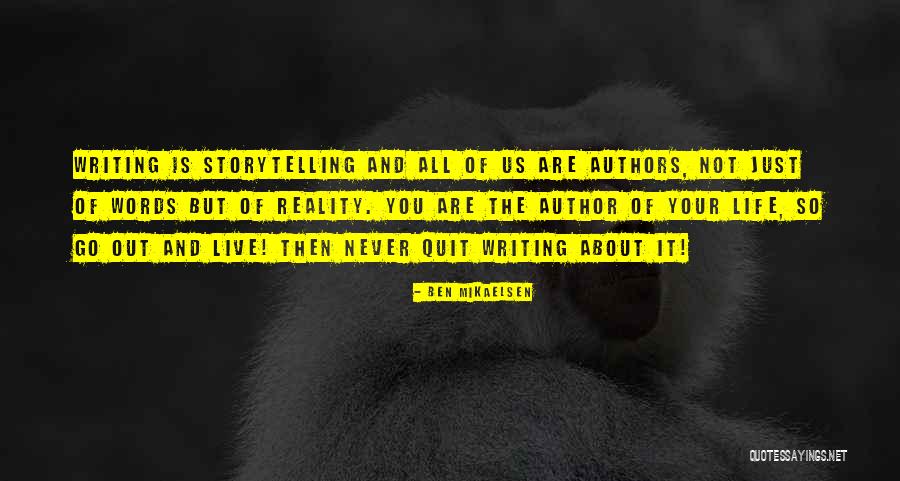
Writing is storytelling and all of us are authors, not just of words but of reality. You are the author of your life, so go out and live! Then never quit writing about it! — Ben Mikaelsen
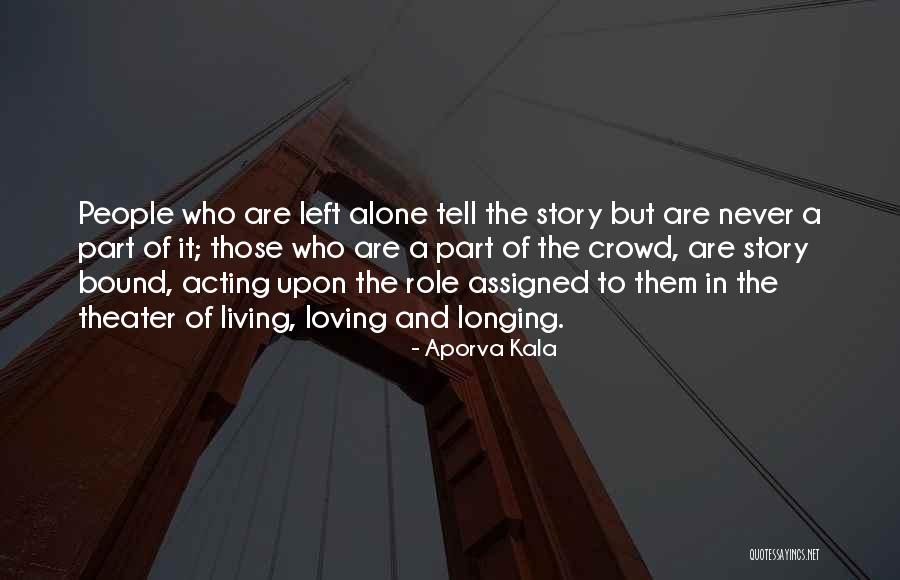
People who are left alone tell the story but are never a part of it; those who are a part of the crowd, are story bound, acting upon the role assigned to them in the theater of living, loving and longing. — Aporva Kala
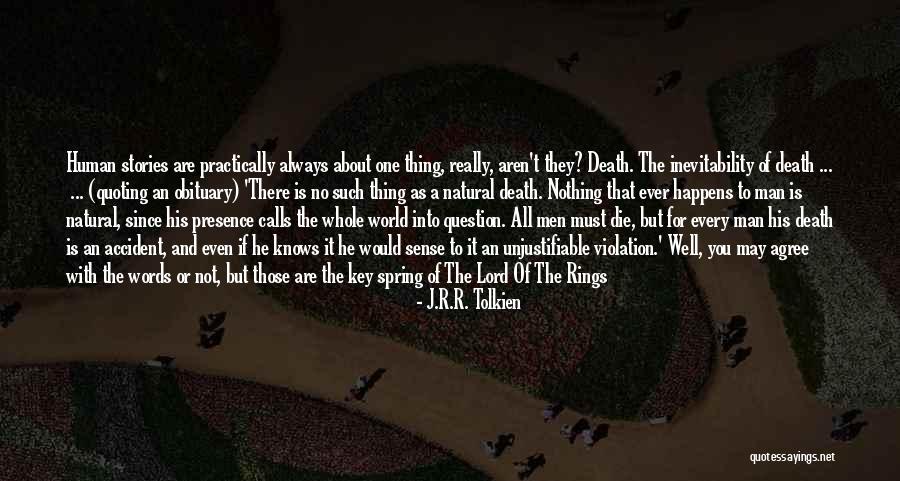
Human stories are practically always about one thing, really, aren't they? Death. The inevitability of death ...
... (quoting an obituary) 'There is no such thing as a natural death. Nothing that ever happens to man is natural, since his presence calls the whole world into question. All men must die, but for every man his death is an accident, and even if he knows it he would sense to it an unjustifiable violation.' Well, you may agree with the words or not, but those are the key spring of The Lord Of The Rings — J.R.R. Tolkien
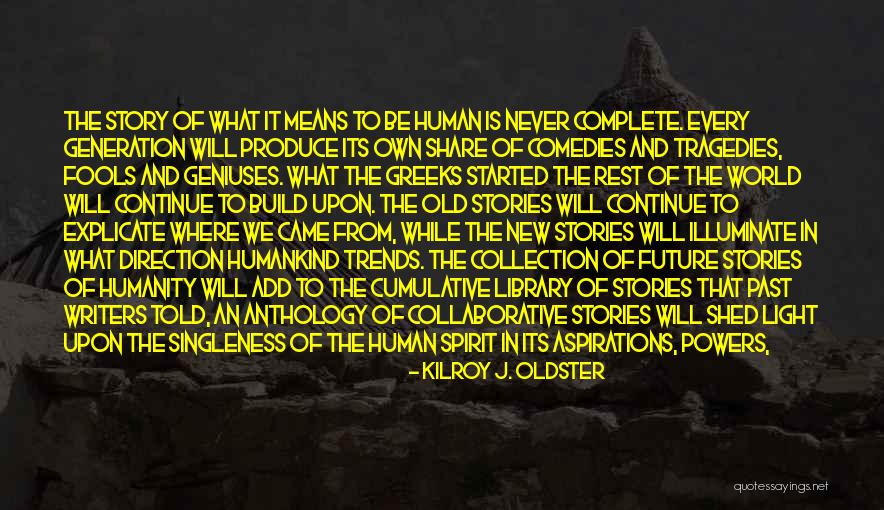
The story of what it means to be human is never complete. Every generation will produce its own share of comedies and tragedies, fools and geniuses. What the Greeks started the rest of the world will continue to build upon. The old stories will continue to explicate where we came from, while the new stories will illuminate in what direction humankind trends. The collection of future stories of humanity will add to the cumulative library of stories that past writers told, an anthology of collaborative stories will shed light upon the singleness of the human spirit in its aspirations, powers, vicissitudes, and wisdom. — Kilroy J. Oldster
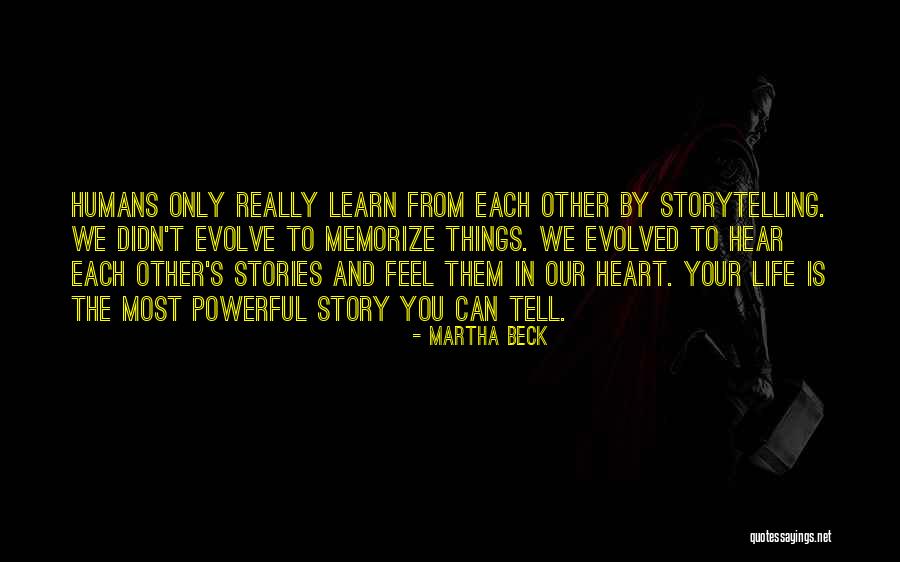
Humans only really learn from each other by storytelling. We didn't evolve to memorize things. We evolved to hear each other's stories and feel them in our heart. Your life is the most powerful story you can tell. — Martha Beck
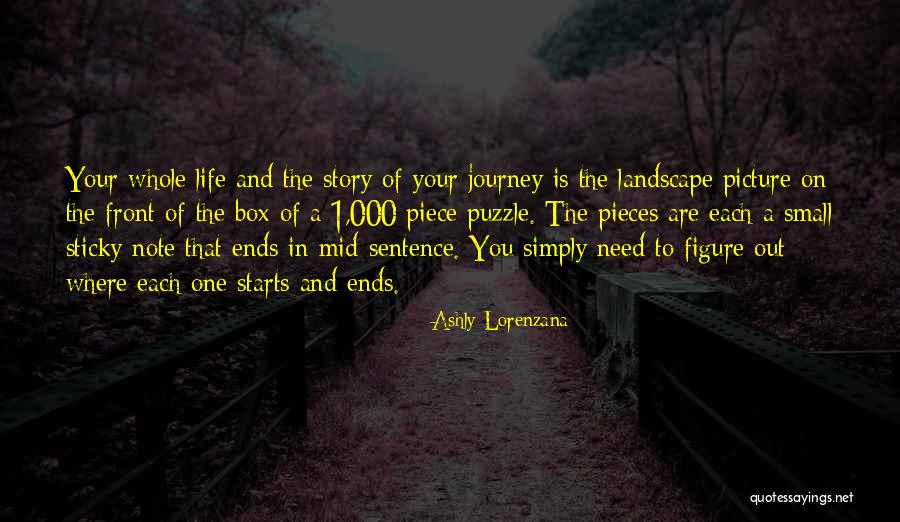
Your whole life and the story of your journey is the landscape picture on the front of the box of a 1,000 piece puzzle. The pieces are each a small sticky note that ends in mid-sentence. You simply need to figure out where each one starts and ends. — Ashly Lorenzana
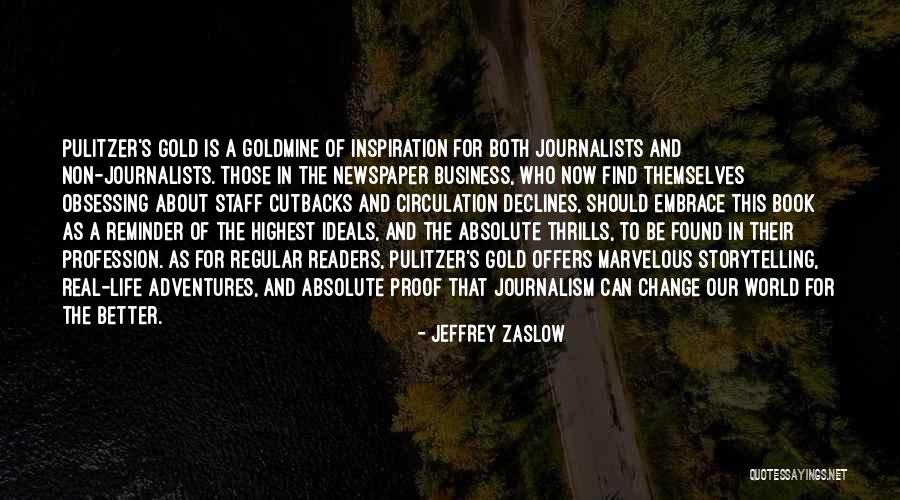
Pulitzer's Gold is a goldmine of inspiration for both journalists and non-journalists. Those in the newspaper business, who now find themselves obsessing about staff cutbacks and circulation declines, should embrace this book as a reminder of the highest ideals, and the absolute thrills, to be found in their profession. As for regular readers, Pulitzer's Gold offers marvelous storytelling, real-life adventures, and absolute proof that journalism can change our world for the better. — Jeffrey Zaslow
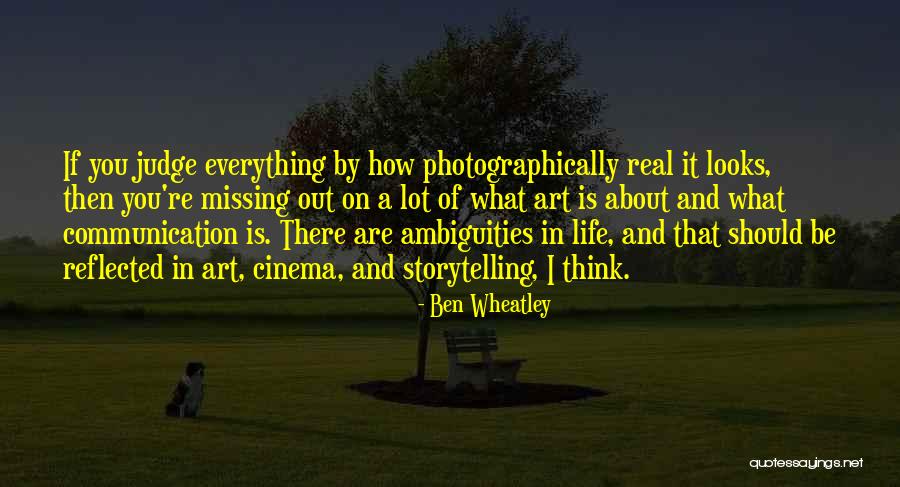
If you judge everything by how photographically real it looks, then you're missing out on a lot of what art is about and what communication is. There are ambiguities in life, and that should be reflected in art, cinema, and storytelling, I think. — Ben Wheatley
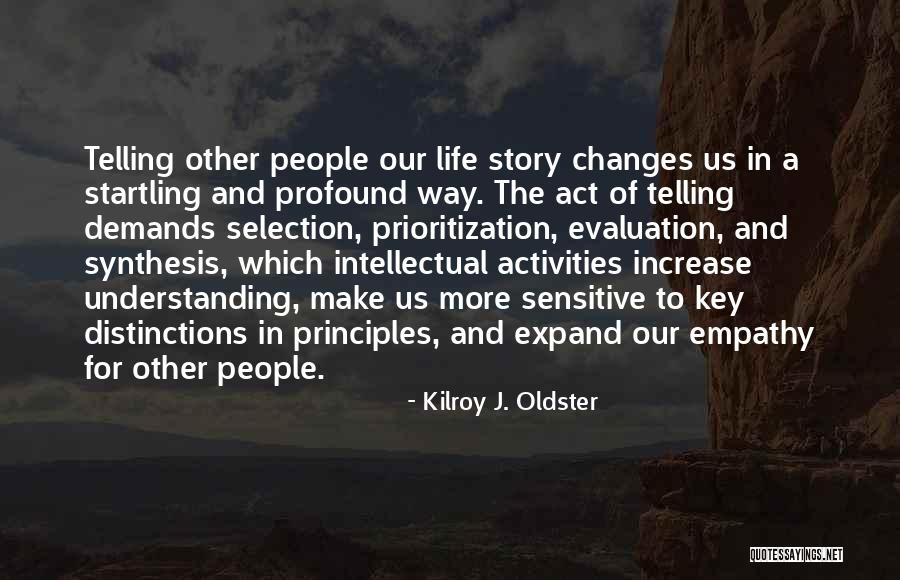
Telling other people our life story changes us in a startling and profound way. The act of telling demands selection, prioritization, evaluation, and synthesis, which intellectual activities increase understanding, make us more sensitive to key distinctions in principles, and expand our empathy for other people. — Kilroy J. Oldster
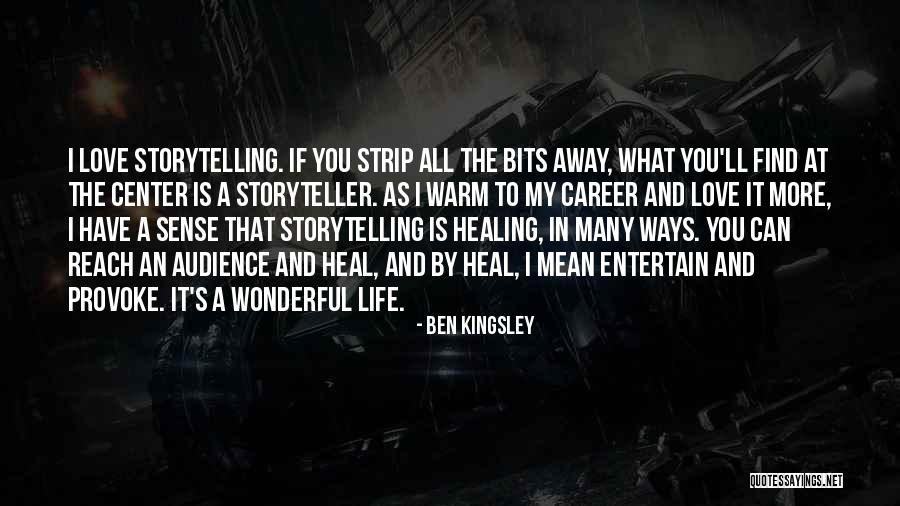
I love storytelling. If you strip all the bits away, what you'll find at the center is a storyteller. As I warm to my career and love it more, I have a sense that storytelling is healing, in many ways. You can reach an audience and heal, and by heal, I mean entertain and provoke. It's a wonderful life. — Ben Kingsley
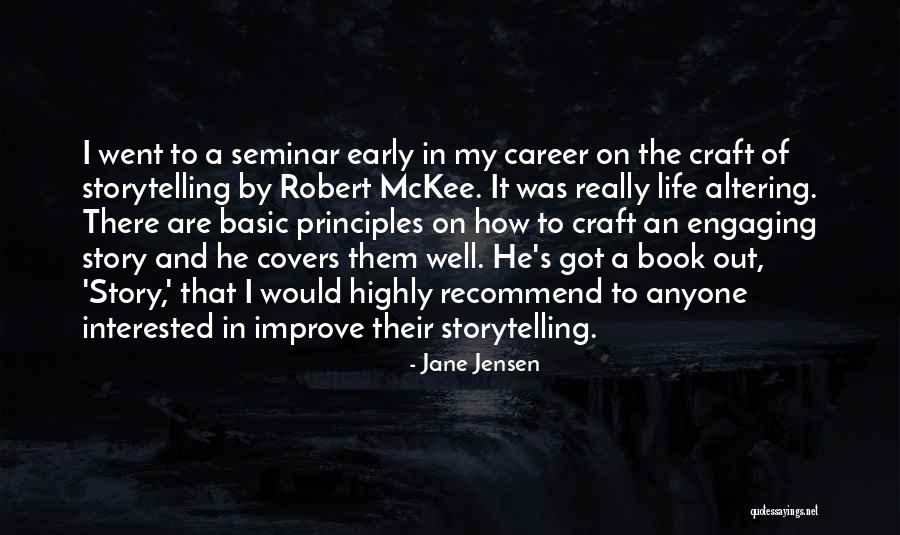
I went to a seminar early in my career on the craft of storytelling by Robert McKee. It was really life altering. There are basic principles on how to craft an engaging story and he covers them well. He's got a book out, 'Story,' that I would highly recommend to anyone interested in improve their storytelling. — Jane Jensen
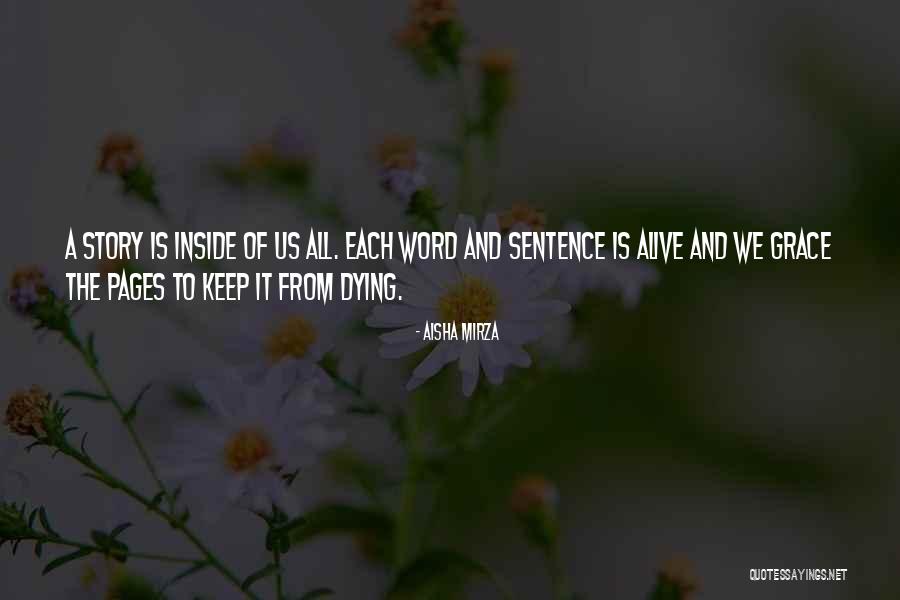
A story is inside of us all. Each word and sentence is alive and we grace the pages to keep it from dying. — Aisha Mirza
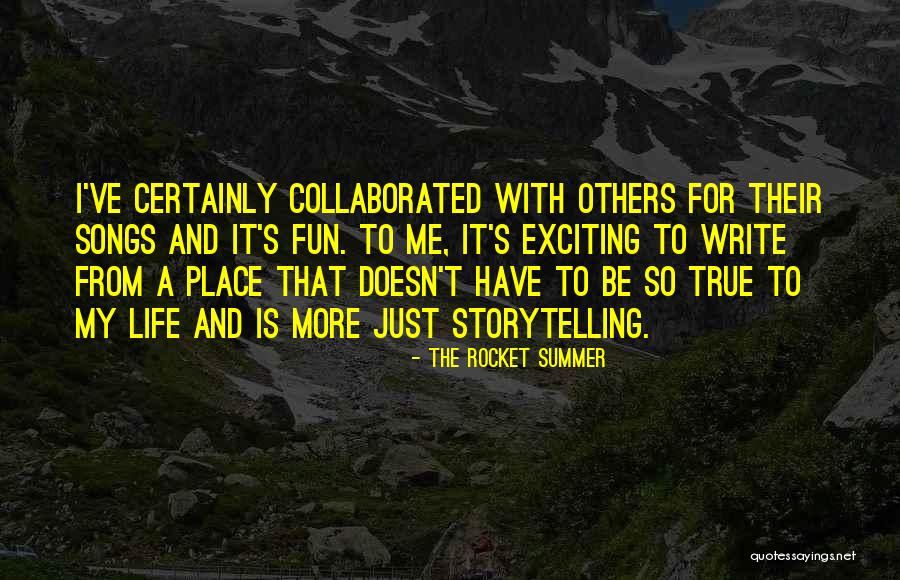
I've certainly collaborated with others for their songs and it's fun. To me, it's exciting to write from a place that doesn't have to be so true to my life and is more just storytelling. — The Rocket Summer
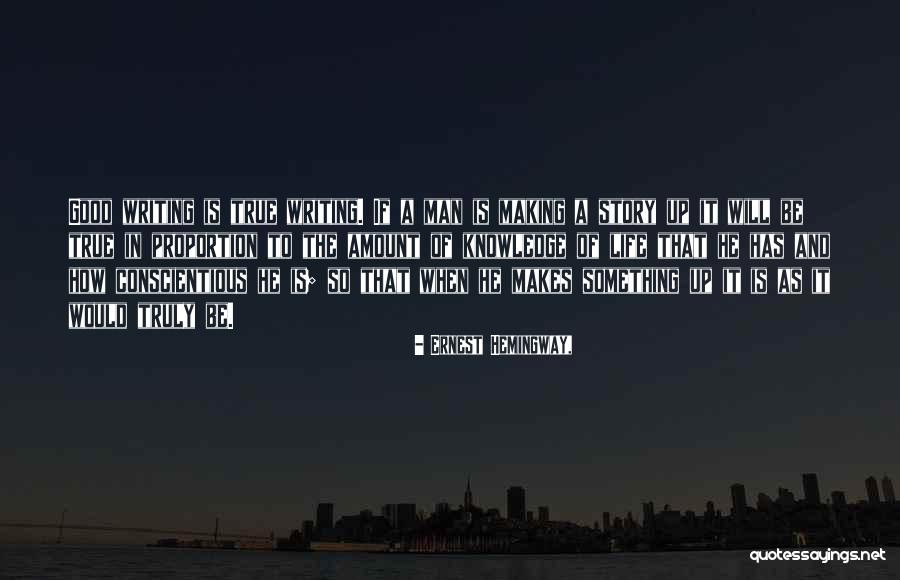
Good writing is true writing. If a man is making a story up it will be true in proportion to the amount of knowledge of life that he has and how conscientious he is; so that when he makes something up it is as it would truly be. — Ernest Hemingway,
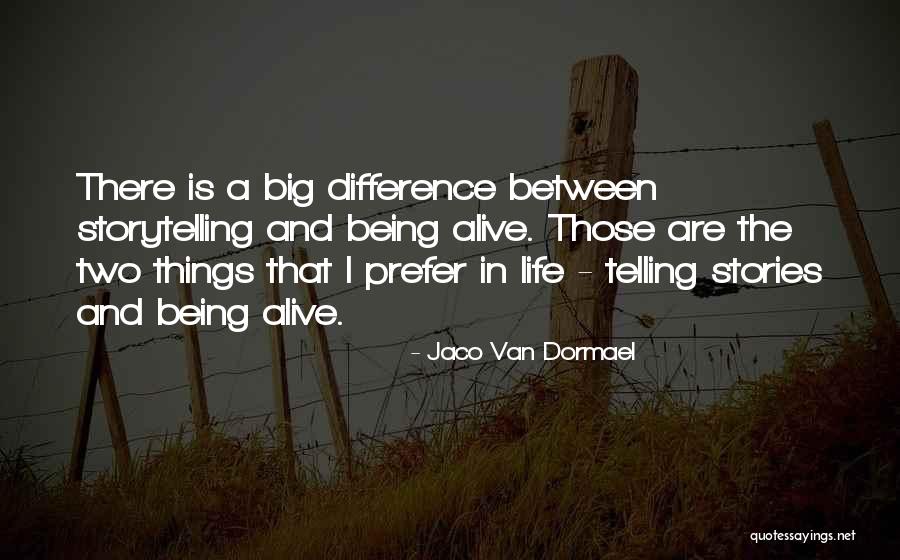
There is a big difference between storytelling and being alive. Those are the two things that I prefer in life - telling stories and being alive. — Jaco Van Dormael
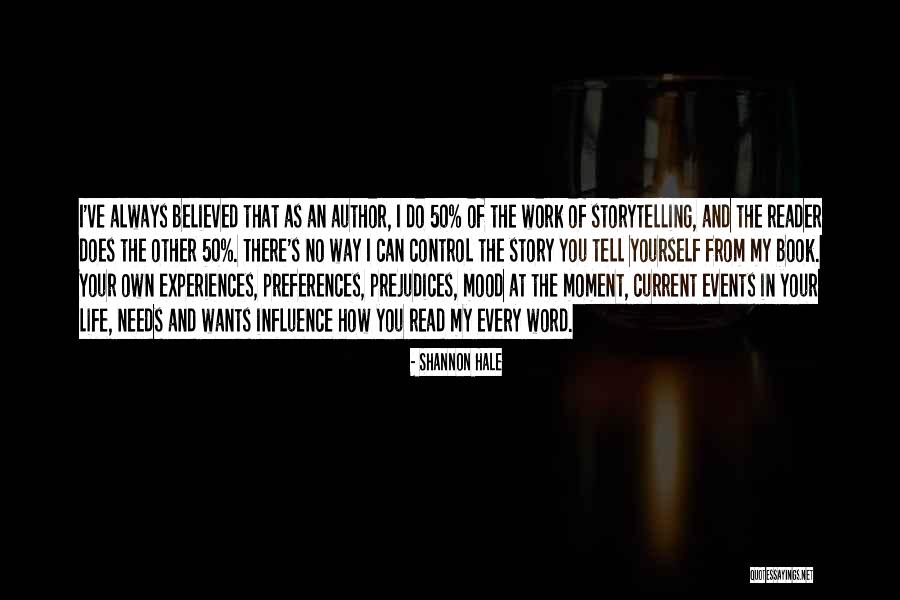
I've always believed that as an author, I do 50% of the work of storytelling, and the reader does the other 50%. There's no way I can control the story you tell yourself from my book. Your own experiences, preferences, prejudices, mood at the moment, current events in your life, needs and wants influence how you read my every word. — Shannon Hale

Many of you know little about storytelling. Before I begin, let me explain. The Story is the story of us all. If understood properly, it is of immense power. It tells you who you are, what you might expect from this life. Some believe it can foretell the future. Mastery of the Story gives you mastery over life itself. It contains precious, holy relics of the age of giants which preceded us. It tells of our rise, our glories and our occasional disgraces. It tells of our fathers and grandfathers, of the animals and the trees and the spirits, containing all the knowledge you need to please them so they will help rather than punish you. — Iain Pears
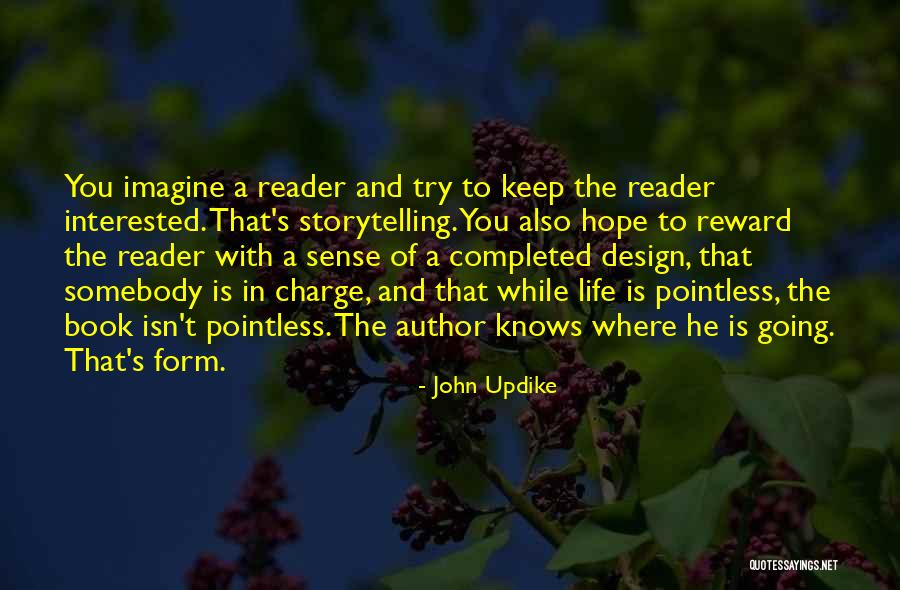
You imagine a reader and try to keep the reader interested. That's storytelling. You also hope to reward the reader with a sense of a completed design, that somebody is in charge, and that while life is pointless, the book isn't pointless. The author knows where he is going. That's form. — John Updike
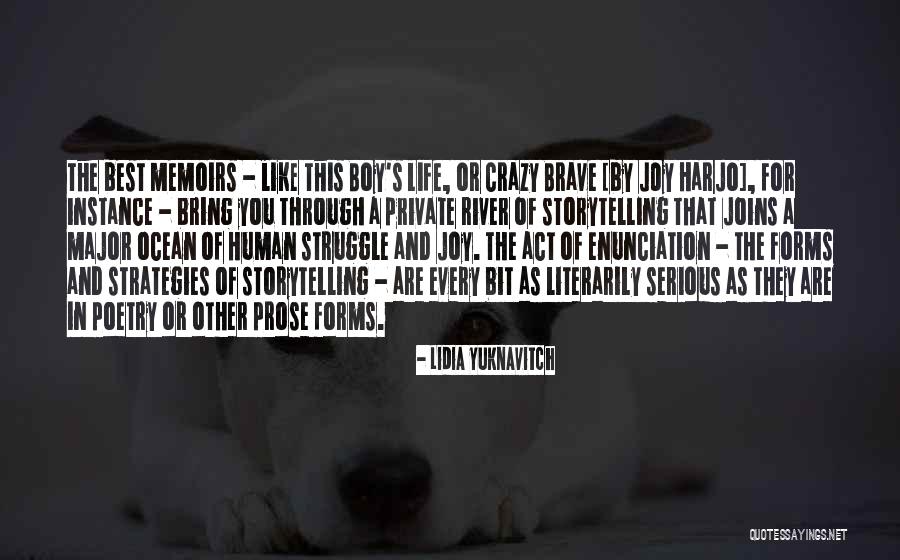
The best memoirs - like This Boy's Life, or Crazy Brave [by Joy Harjo], for instance - bring you through a private river of storytelling that joins a major ocean of human struggle and joy. The act of enunciation - the forms and strategies of storytelling - are every bit as literarily serious as they are in poetry or other prose forms. — Lidia Yuknavitch
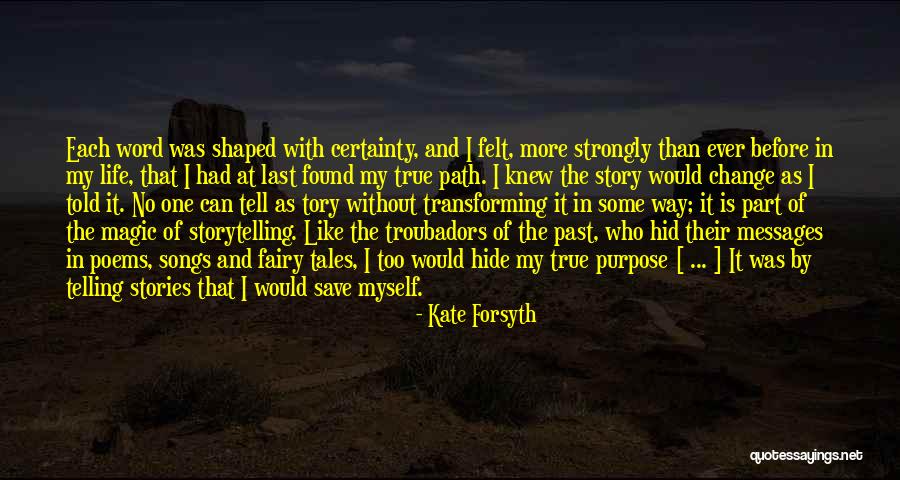
Each word was shaped with certainty, and I felt, more strongly than ever before in my life, that I had at last found my true path. I knew the story would change as I told it. No one can tell as tory without transforming it in some way; it is part of the magic of storytelling. Like the troubadors of the past, who hid their messages in poems, songs and fairy tales, I too would hide my true purpose [ ... ]
It was by telling stories that I would save myself. — Kate Forsyth
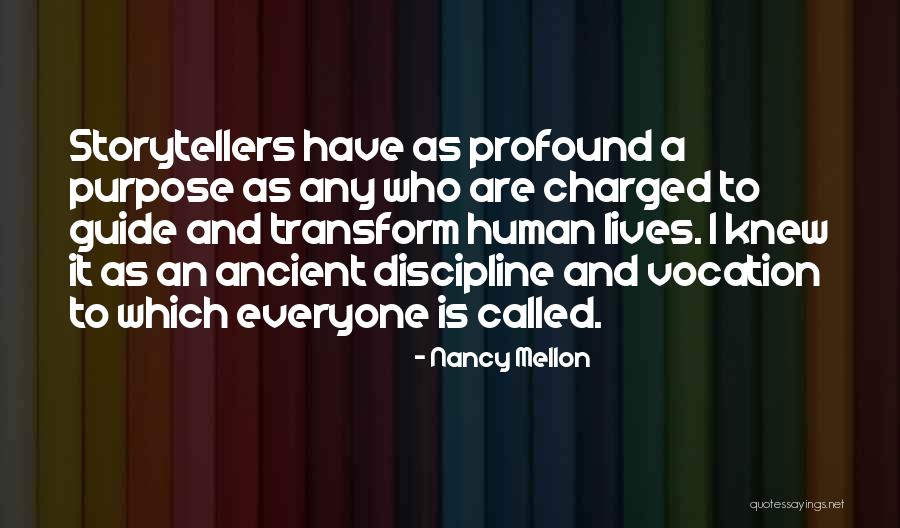
Storytellers have as profound a purpose as any who are charged to guide and transform human lives. I knew it as an ancient discipline and vocation to which everyone is called. — Nancy Mellon
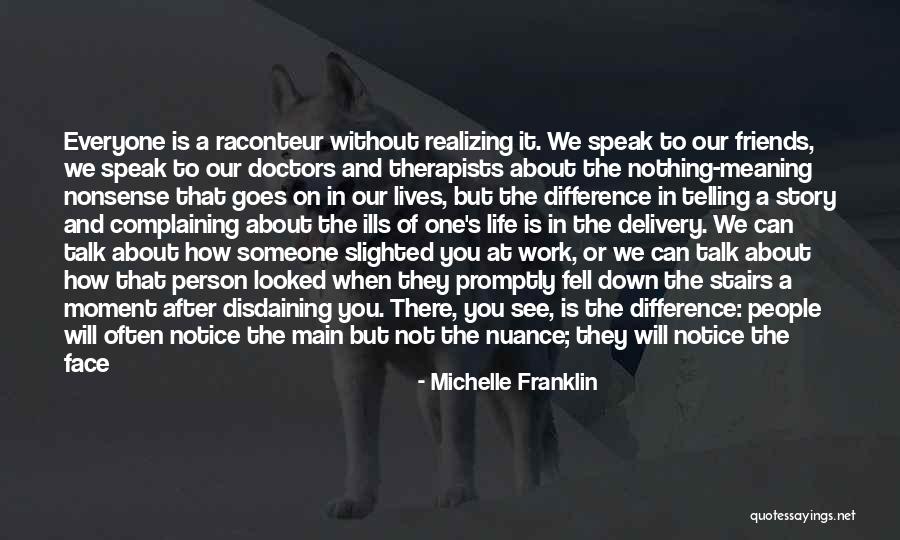
Everyone is a raconteur without realizing it. We speak to our friends, we speak to our doctors and therapists about the nothing-meaning nonsense that goes on in our lives, but the difference in telling a story and complaining about the ills of one's life is in the delivery. We can talk about how someone slighted you at work, or we can talk about how that person looked when they promptly fell down the stairs a moment after disdaining you. There, you see, is the difference: people will often notice the main but not the nuance; they will notice the face of the person yelling at them and the pitch of their shouts, but will not notice the comfort that the ululations of agony and twisted limbs lying on the bottom stile can promise. — Michelle Franklin
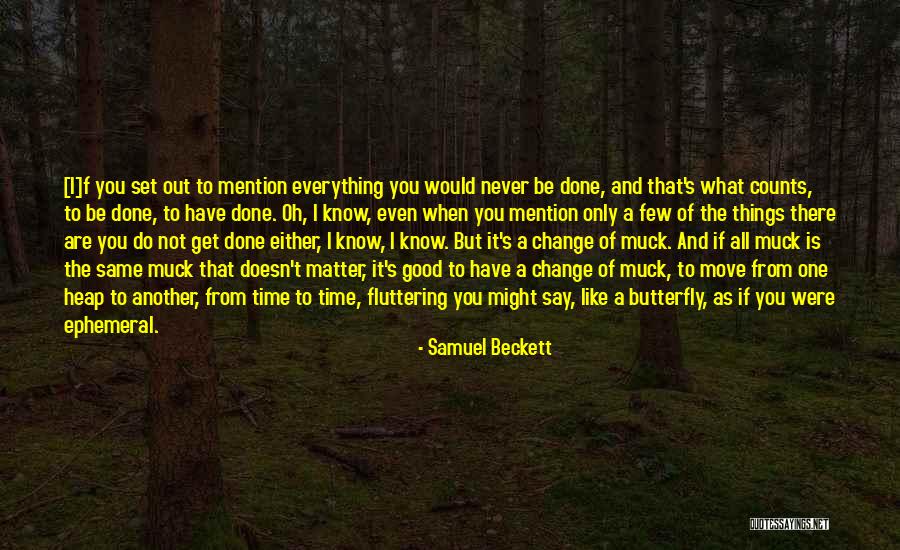
[I]f you set out to mention everything you would never be done, and that's what counts, to be done, to have done. Oh, I know, even when you mention only a few of the things there are you do not get done either, I know, I know. But it's a change of muck. And if all muck is the same muck that doesn't matter, it's good to have a change of muck, to move from one heap to another, from time to time, fluttering you might say, like a butterfly, as if you were ephemeral. — Samuel Beckett
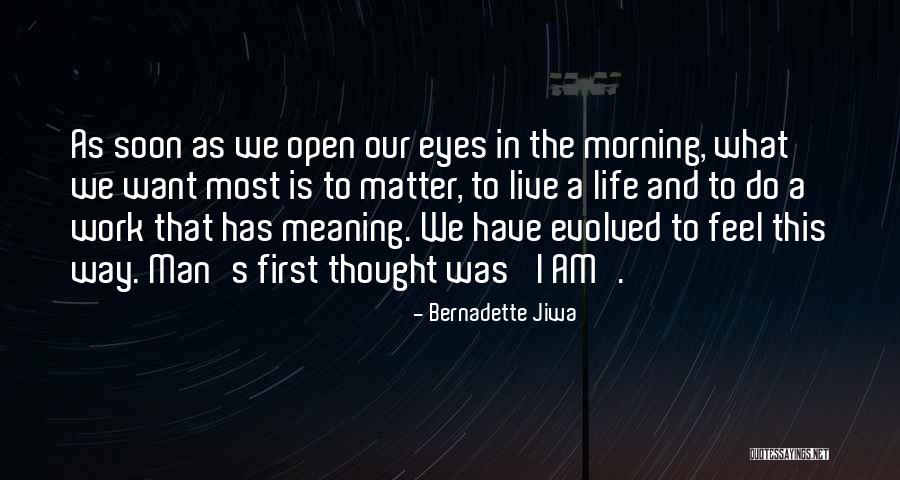
As soon as we open our eyes in the morning, what we want most is to matter, to live a life and to do a work that has meaning. We have evolved to feel this way. Man's first thought was 'I AM'. — Bernadette Jiwa
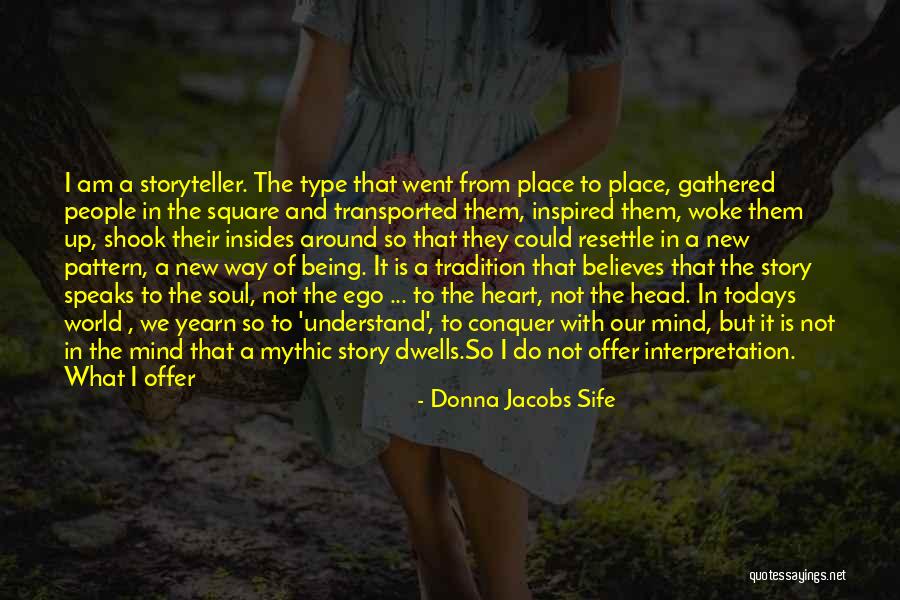
I am a storyteller. The type that went from place to place, gathered people in the square and transported them, inspired them, woke them up, shook their insides around so that they could resettle in a new pattern, a new way of being. It is a tradition that believes that the story speaks to the soul, not the ego ... to the heart, not the head. In todays world , we yearn so to 'understand', to conquer with our mind, but it is not in the mind that a mythic story dwells.
So I do not offer interpretation. What I offer is to tell the story again, and again ... on and on, if need be - until the ego has stepped aside and the soul can hear. I trust that the life of the story continues long after I have gone, if the listener can step aside and be taken up and in, to a world where words speak not to the mind, but to the soul.
I invite you to trust it too. — Donna Jacobs Sife
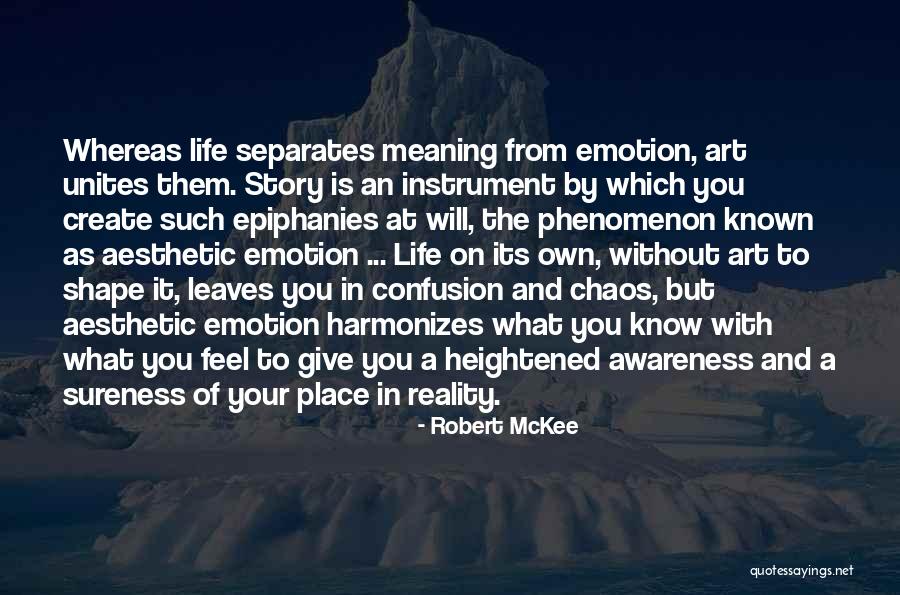
Whereas life separates meaning from emotion, art unites them. Story is an instrument by which you create such epiphanies at will, the phenomenon known as aesthetic emotion ... Life on its own, without art to shape it, leaves you in confusion and chaos, but aesthetic emotion harmonizes what you know with what you feel to give you a heightened awareness and a sureness of your place in reality. — Robert McKee
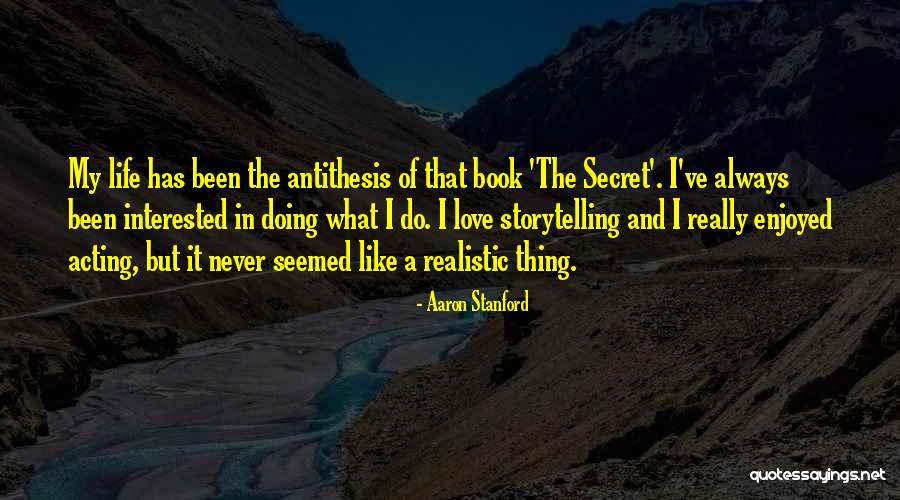
My life has been the antithesis of that book 'The Secret'. I've always been interested in doing what I do. I love storytelling and I really enjoyed acting, but it never seemed like a realistic thing. — Aaron Stanford
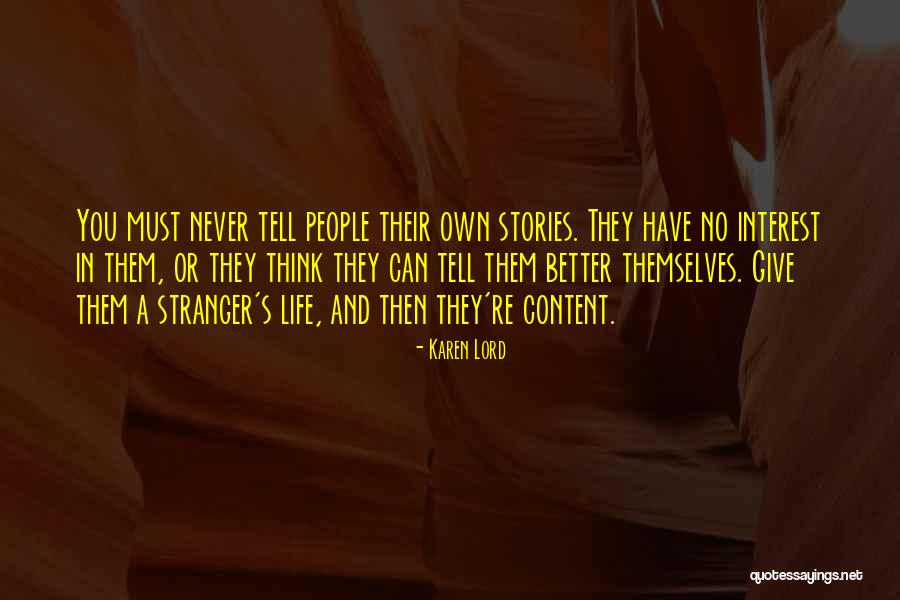
You must never tell people their own stories. They have no interest in them, or they think they can tell them better themselves. Give them a stranger's life, and then they're content. — Karen Lord
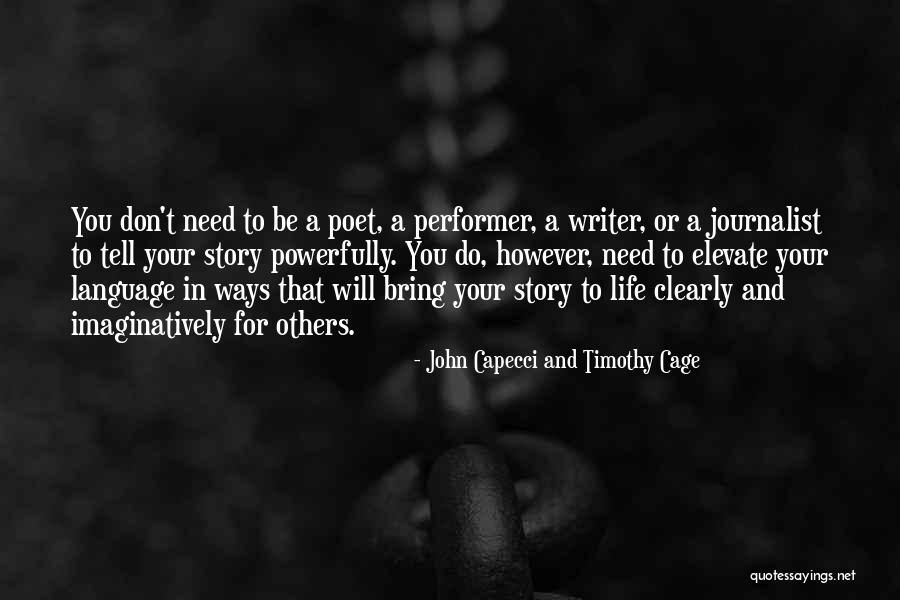
You don't need to be a poet, a performer, a writer, or a journalist to tell your story powerfully. You do, however, need to elevate your language in ways that will bring your story to life clearly and imaginatively for others. — John Capecci And Timothy Cage
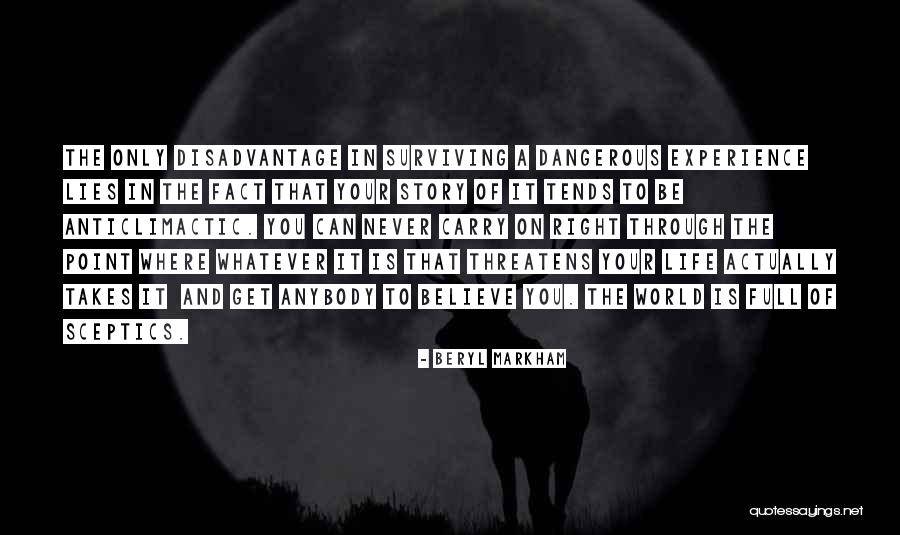
The only disadvantage in surviving a dangerous experience lies in the fact that your story of it tends to be anticlimactic. You can never carry on right through the point where whatever it is that threatens your life actually takes it
and get anybody to believe you. The world is full of sceptics. — Beryl Markham
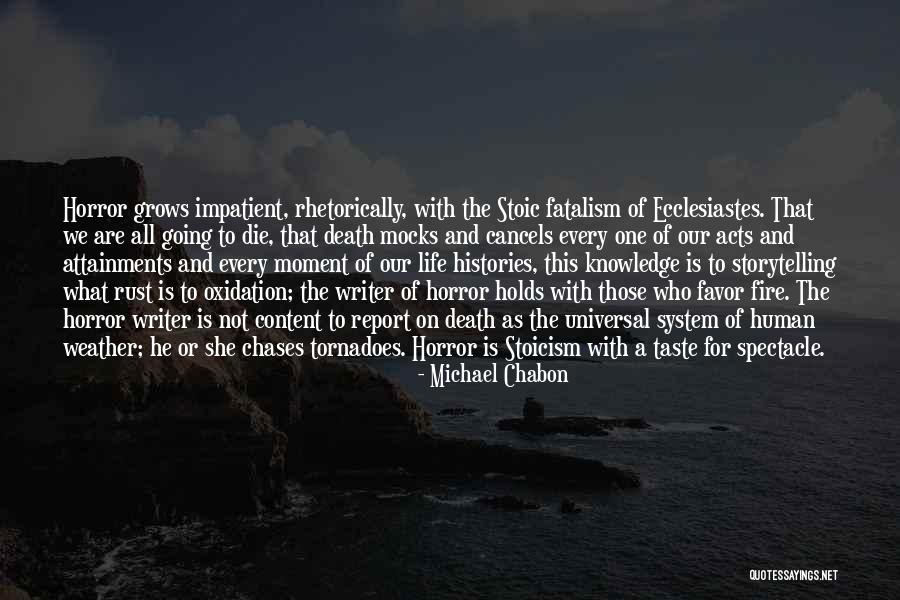
Horror grows impatient, rhetorically, with the Stoic fatalism of Ecclesiastes. That we are all going to die, that death mocks and cancels every one of our acts and attainments and every moment of our life histories, this knowledge is to storytelling what rust is to oxidation; the writer of horror holds with those who favor fire. The horror writer is not content to report on death as the universal system of human weather; he or she chases tornadoes. Horror is Stoicism with a taste for spectacle. — Michael Chabon
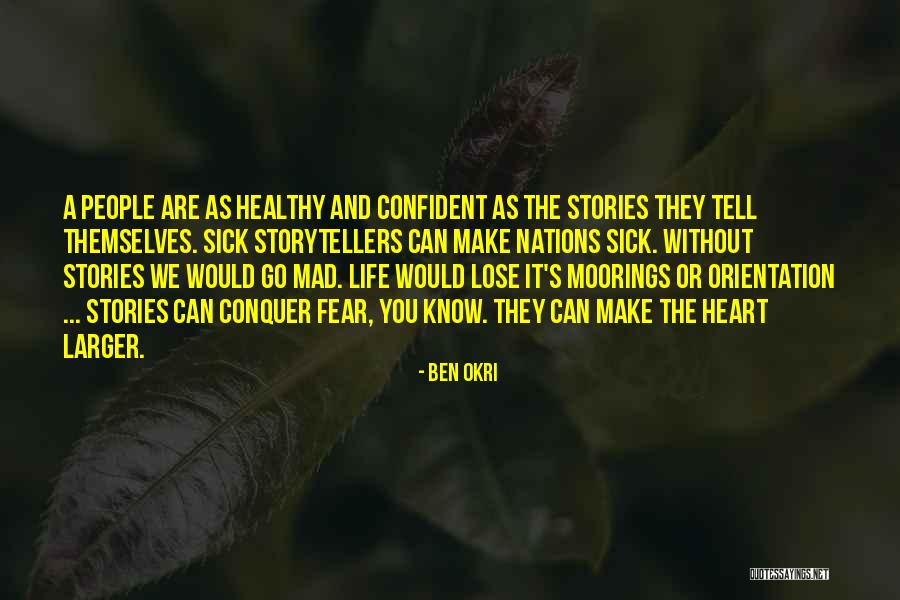
A people are as healthy and confident as the stories they tell themselves. Sick storytellers can make nations sick. Without stories we would go mad. Life would lose it's moorings or orientation ... Stories can conquer fear, you know. They can make the heart larger. — Ben Okri
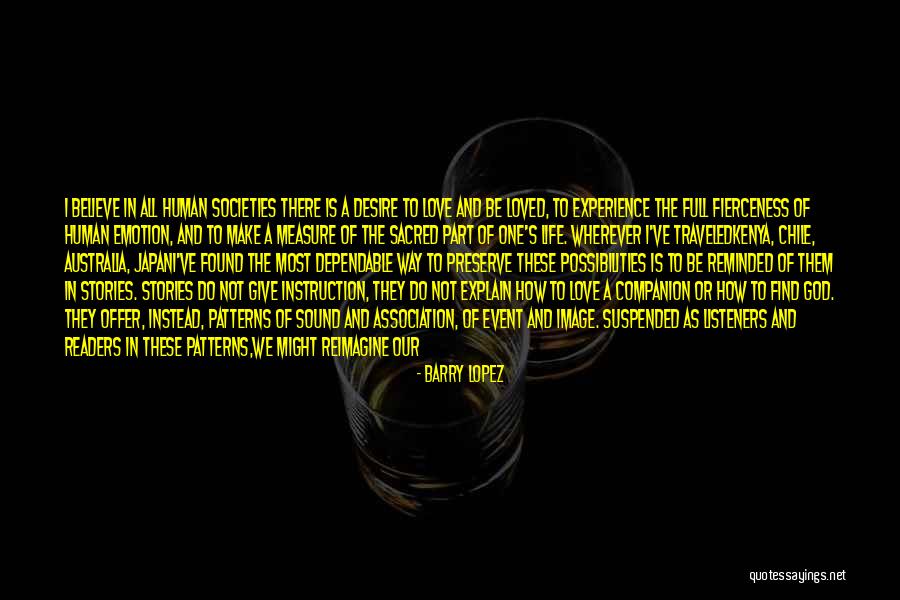
I believe in all human societies there is a desire to love and be loved, to experience the full fierceness of human emotion, and to make a measure of the sacred part of one's life. Wherever I've traveled
Kenya, Chile, Australia, Japan
I've found the most dependable way to preserve these possibilities is to be reminded of them in stories. Stories do not give instruction, they do not explain how to love a companion or how to find God. They offer, instead, patterns of sound and association, of event and image. Suspended as listeners and readers in these patterns,we might reimagine our lives. It is through story that we embrace the great breadth of memory, that we can distinguish what is true, and that we may glimpse, at least occasionally, how to live without despair in the midst of the horror that dogs and unhinges us. — Barry Lopez
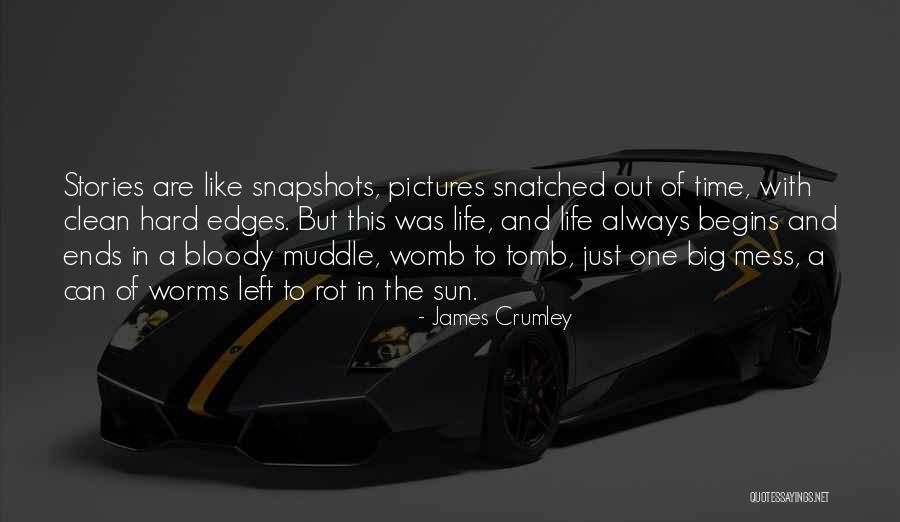
Stories are like snapshots, pictures snatched out of time, with clean hard edges. But this was life, and life always begins and ends in a bloody muddle, womb to tomb, just one big mess, a can of worms left to rot in the sun. — James Crumley
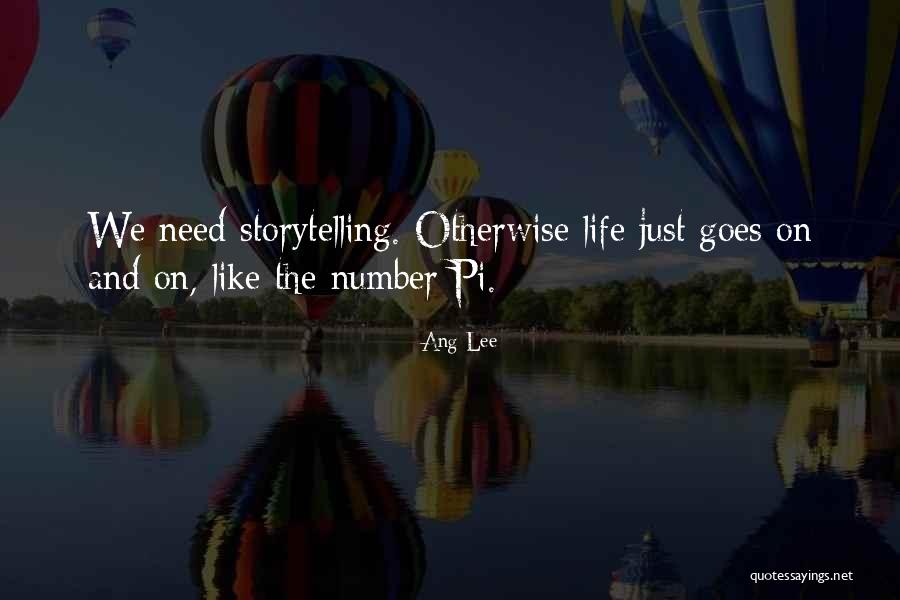
We need storytelling. Otherwise life just goes on and on, like the number Pi. — Ang Lee
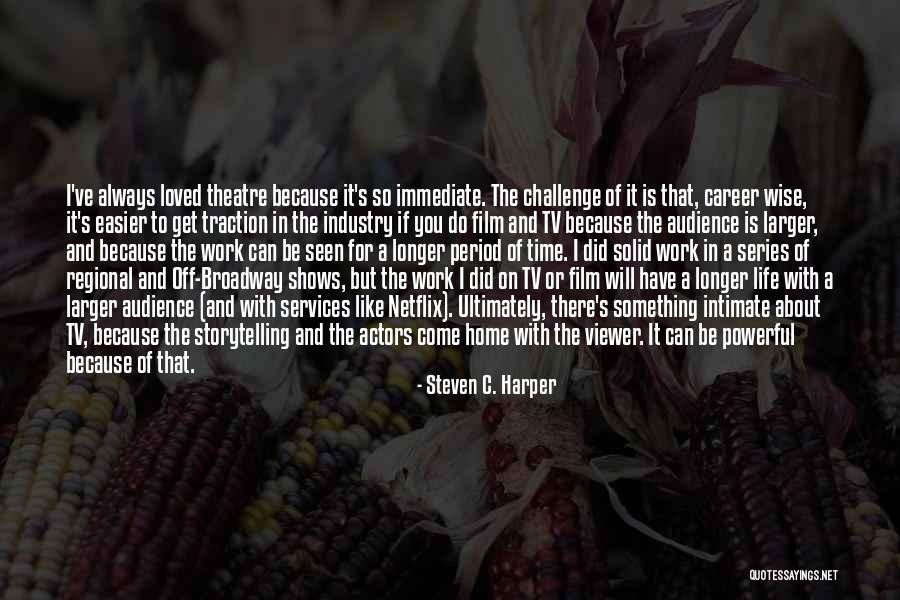
I've always loved theatre because it's so immediate. The challenge of it is that, career wise, it's easier to get traction in the industry if you do film and TV because the audience is larger, and because the work can be seen for a longer period of time. I did solid work in a series of regional and Off-Broadway shows, but the work I did on TV or film will have a longer life with a larger audience (and with services like Netflix). Ultimately, there's something intimate about TV, because the storytelling and the actors come home with the viewer. It can be powerful because of that. — Steven C. Harper
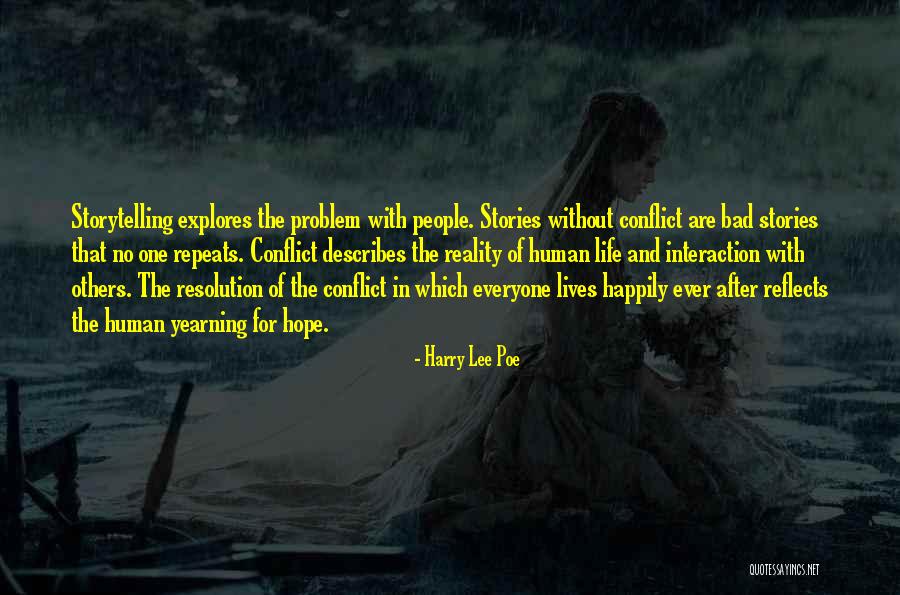
Storytelling explores the problem with people. Stories without conflict are bad stories that no one repeats. Conflict describes the reality of human life and interaction with others. The resolution of the conflict in which everyone lives happily ever after reflects the human yearning for hope. — Harry Lee Poe
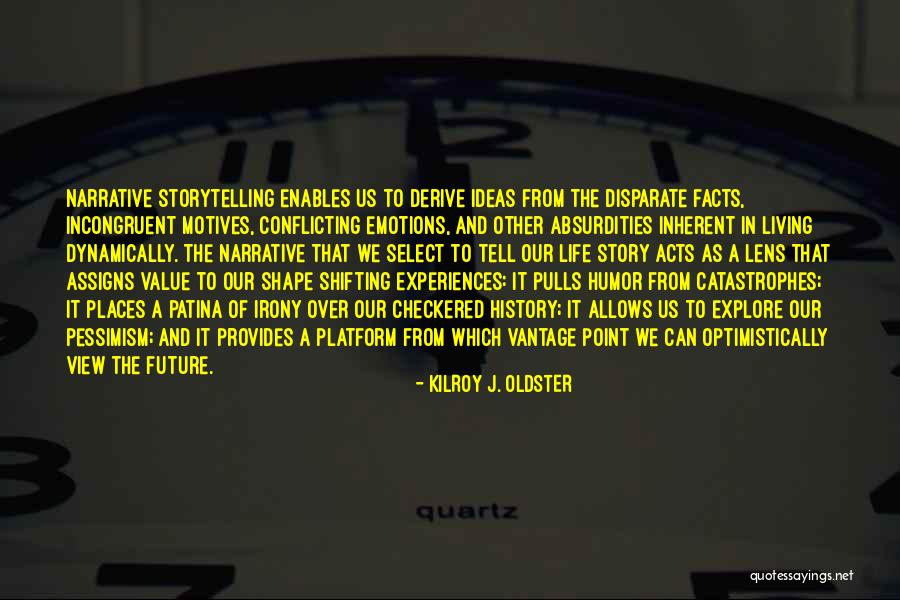
Narrative storytelling enables us to derive ideas from the disparate facts, incongruent motives, conflicting emotions, and other absurdities inherent in living dynamically. The narrative that we select to tell our life story acts as a lens that assigns value to our shape shifting experiences: it pulls humor from catastrophes; it places a patina of irony over our checkered history; it allows us to explore our pessimism; and it provides a platform from which vantage point we can optimistically view the future. — Kilroy J. Oldster
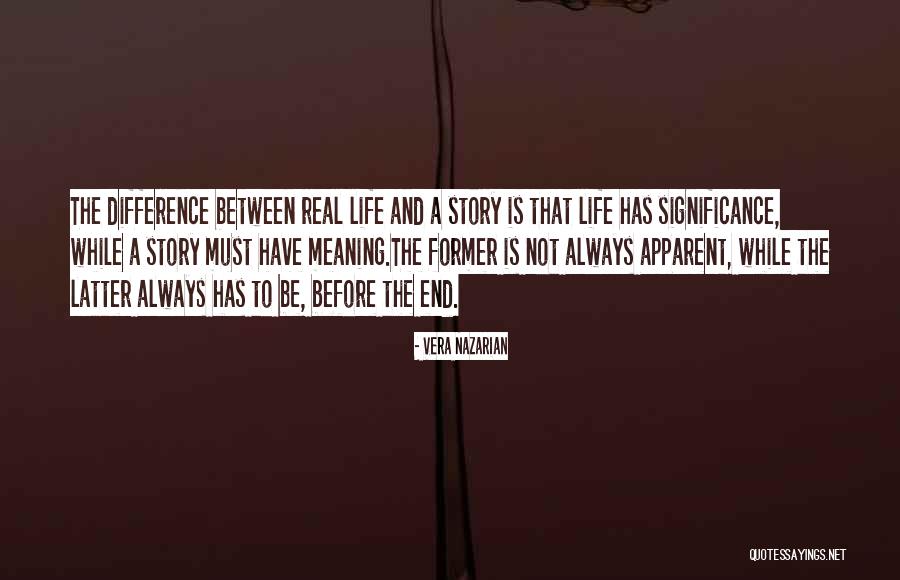
The difference between real life and a story is that life has significance, while a story must have meaning.
The former is not always apparent, while the latter always has to be, before the end. — Vera Nazarian
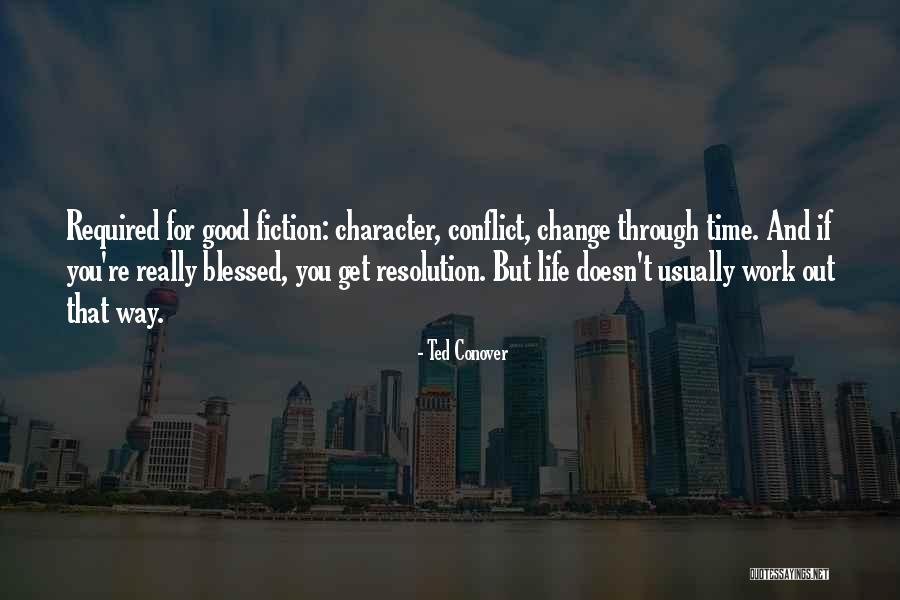
Required for good fiction: character, conflict, change through time. And if you're really blessed, you get resolution. But life doesn't usually work out that way. — Ted Conover
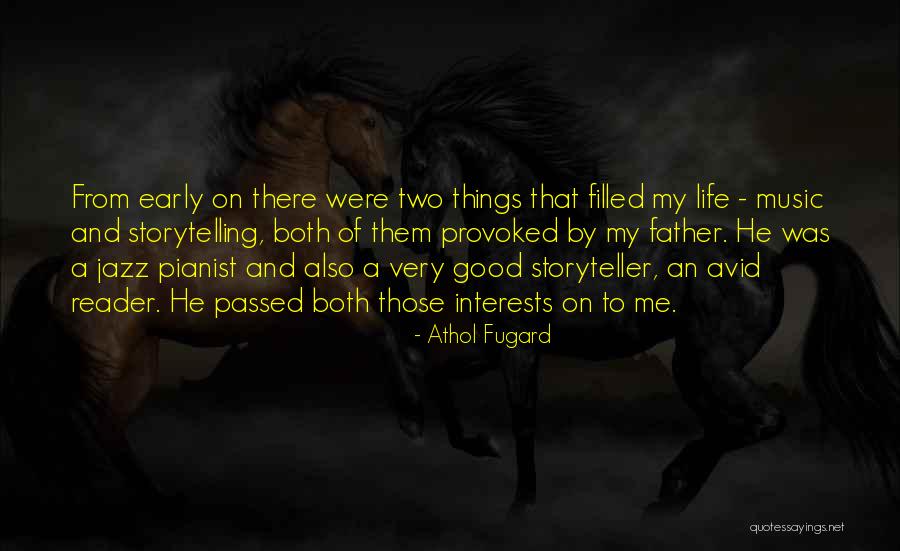
From early on there were two things that filled my life - music and storytelling, both of them provoked by my father. He was a jazz pianist and also a very good storyteller, an avid reader. He passed both those interests on to me. — Athol Fugard
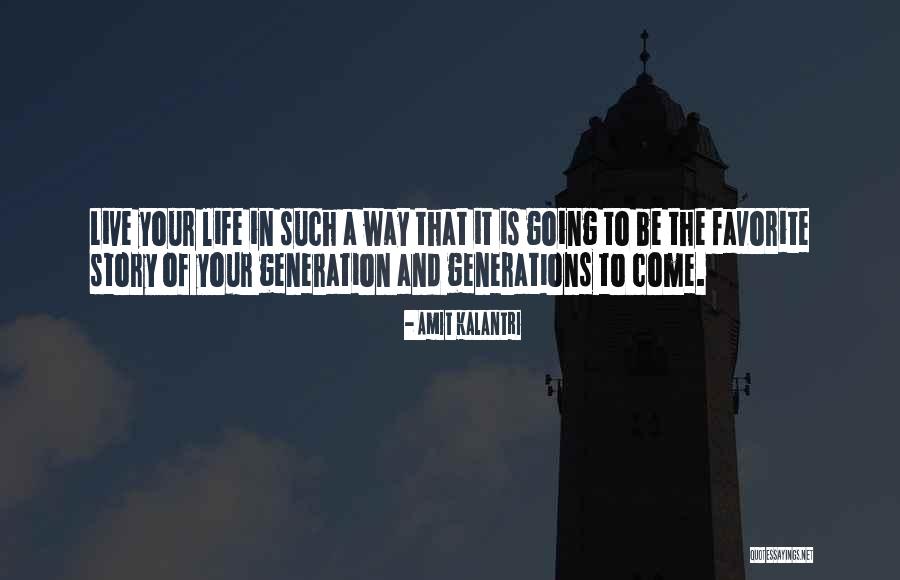
Live your life in such a way that it is going to be the favorite story of your generation and generations to come. — Amit Kalantri
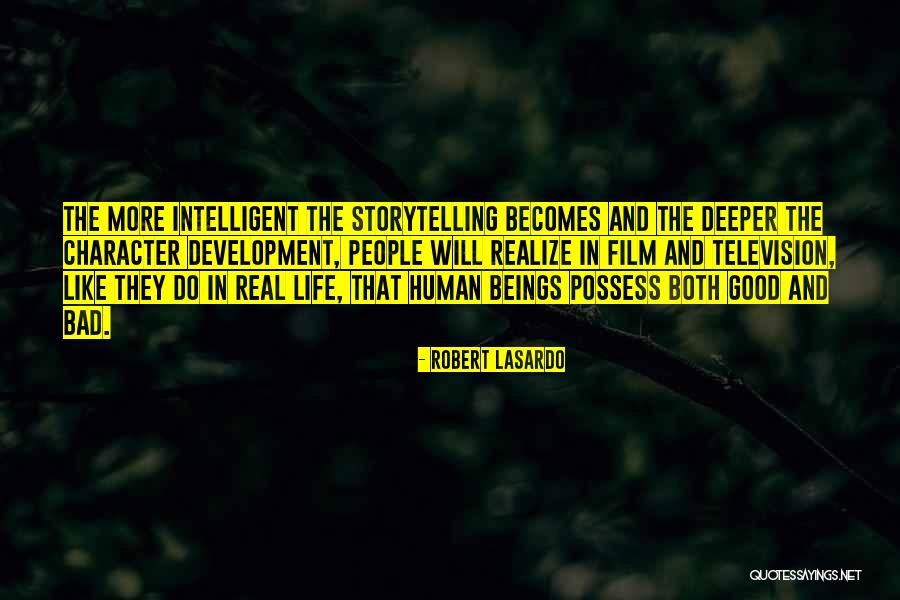
The more intelligent the storytelling becomes and the deeper the character development, people will realize in film and television, like they do in real life, that human beings possess both good and bad. — Robert LaSardo
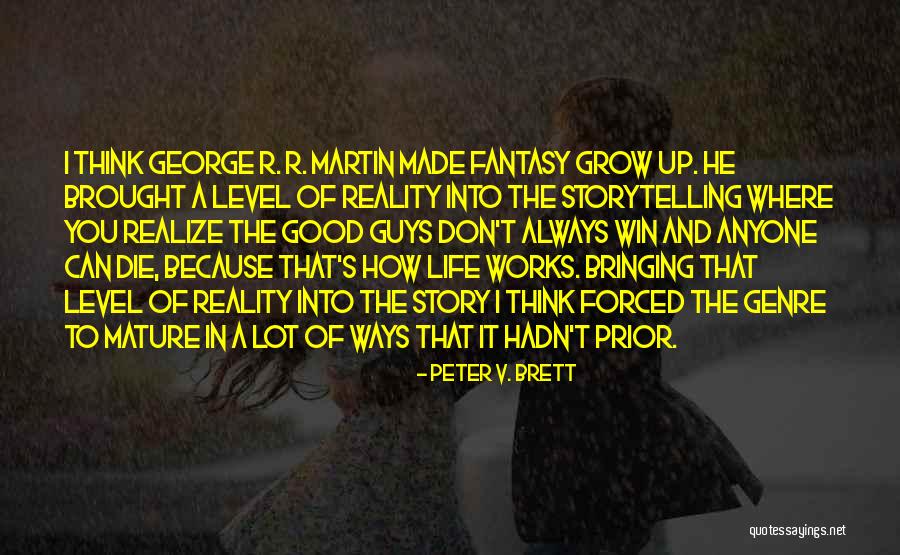
I think George R. R. Martin made fantasy grow up. He brought a level of reality into the storytelling where you realize the good guys don't always win and anyone can die, because that's how life works. Bringing that level of reality into the story I think forced the genre to mature in a lot of ways that it hadn't prior. — Peter V. Brett
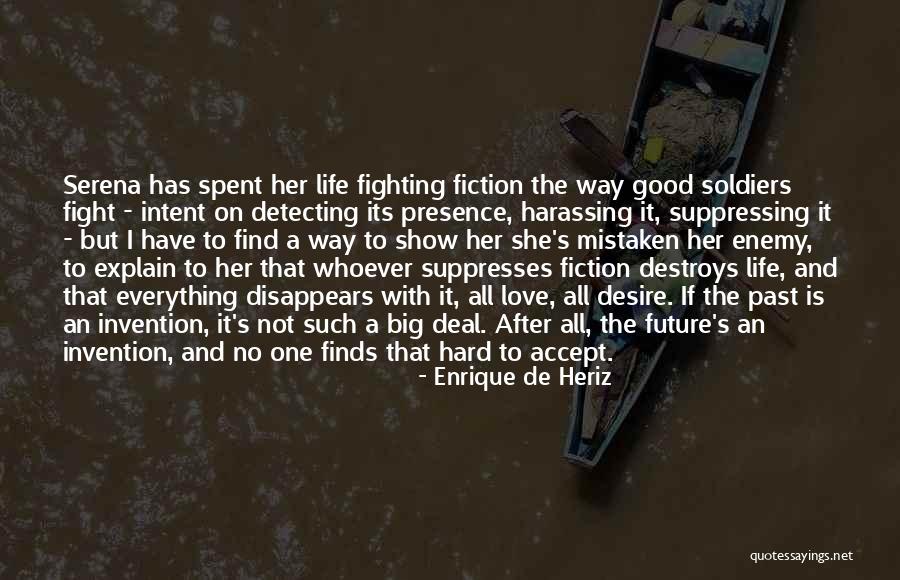
Serena has spent her life fighting fiction the way good soldiers fight - intent on detecting its presence, harassing it, suppressing it - but I have to find a way to show her she's mistaken her enemy, to explain to her that whoever suppresses fiction destroys life, and that everything disappears with it, all love, all desire. If the past is an invention, it's not such a big deal. After all, the future's an invention, and no one finds that hard to accept. — Enrique De Heriz
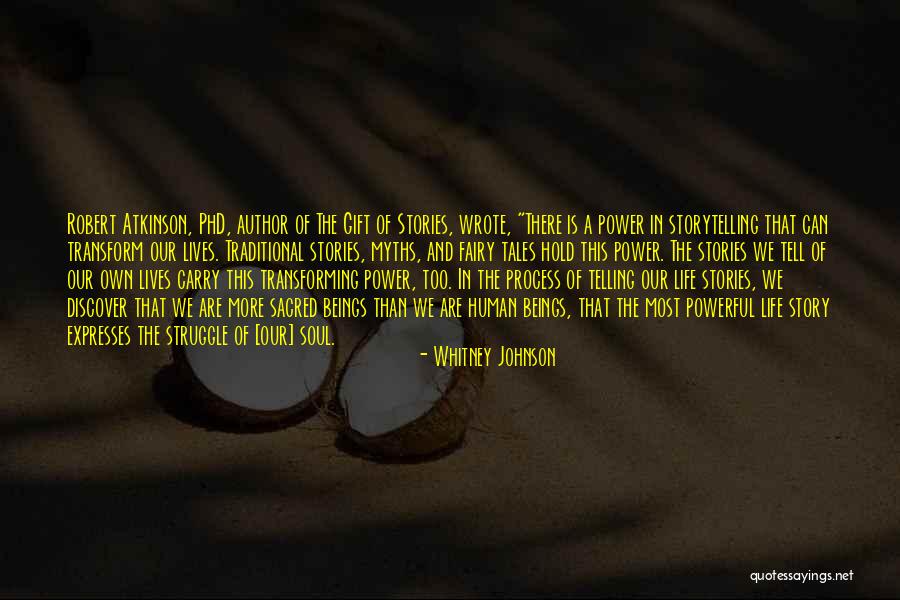
Robert Atkinson, PhD, author of The Gift of Stories, wrote, "There is a power in storytelling that can transform our lives. Traditional stories, myths, and fairy tales hold this power. The stories we tell of our own lives carry this transforming power, too. In the process of telling our life stories, we discover that we are more sacred beings than we are human beings, that the most powerful life story expresses the struggle of [our] soul. — Whitney Johnson
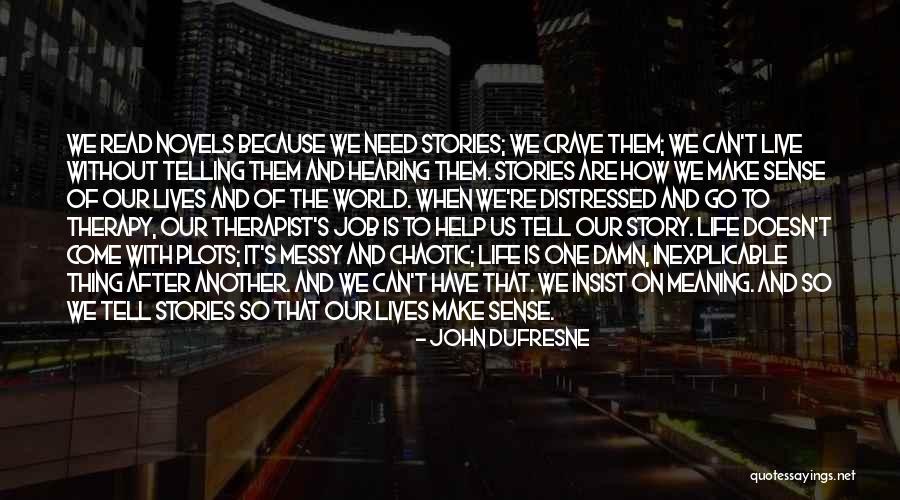
We read novels because we need stories; we crave them; we can't live without telling them and hearing them. Stories are how we make sense of our lives and of the world. When we're distressed and go to therapy, our therapist's job is to help us tell our story. Life doesn't come with plots; it's messy and chaotic; life is one damn, inexplicable thing after another. And we can't have that. We insist on meaning. And so we tell stories so that our lives make sense. — John Dufresne
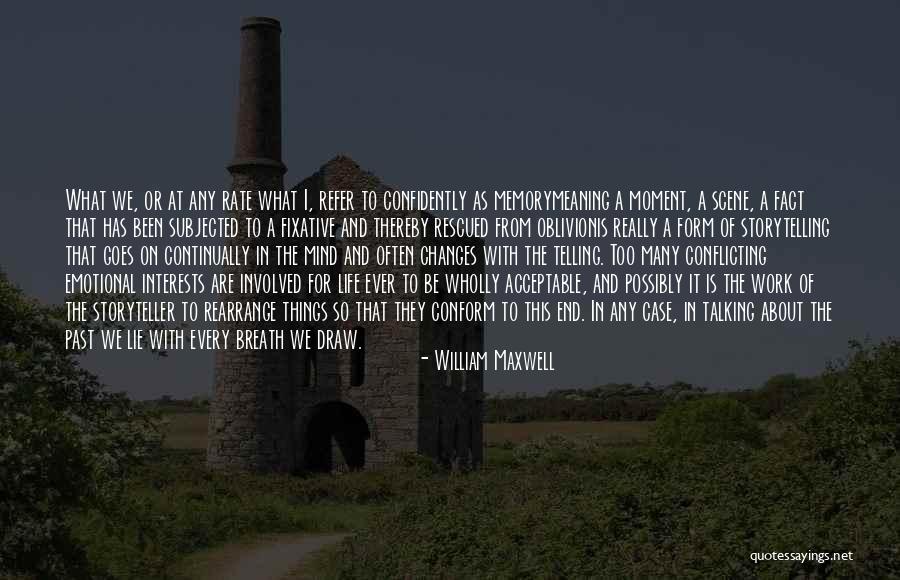
What we, or at any rate what I, refer to confidently as memory
meaning a moment, a scene, a fact that has been subjected to a fixative and thereby rescued from oblivion
is really a form of storytelling that goes on continually in the mind and often changes with the telling. Too many conflicting emotional interests are involved for life ever to be wholly acceptable, and possibly it is the work of the storyteller to rearrange things so that they conform to this end. In any case, in talking about the past we lie with every breath we draw. — William Maxwell
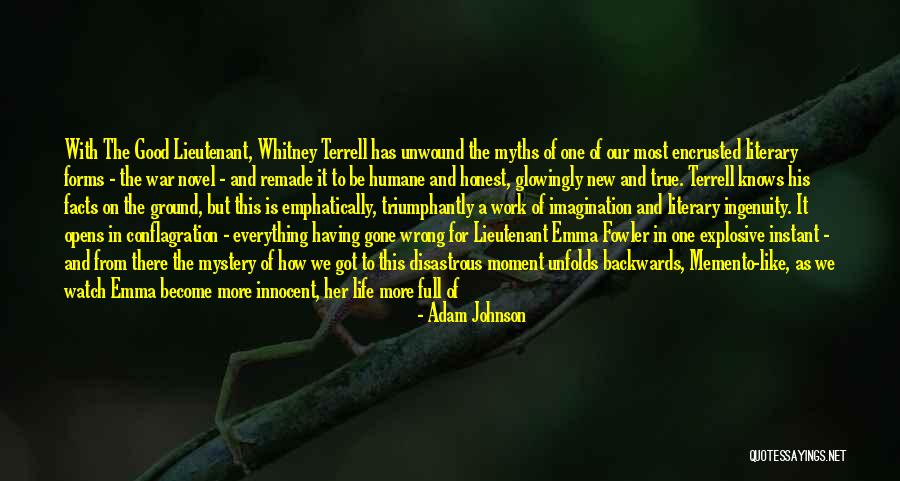
With The Good Lieutenant, Whitney Terrell has unwound the myths of one of our most encrusted literary forms - the war novel - and remade it to be humane and honest, glowingly new and true. Terrell knows his facts on the ground, but this is emphatically, triumphantly a work of imagination and literary ingenuity. It opens in conflagration - everything having gone wrong for Lieutenant Emma Fowler in one explosive instant - and from there the mystery of how we got to this disastrous moment unfolds backwards, Memento-like, as we watch Emma become more innocent, her life more full of hope and possibility, with each day less of war that she has experienced. This is brilliant, bold, heartbreaking storytelling for material that demands nothing less. — Adam Johnson
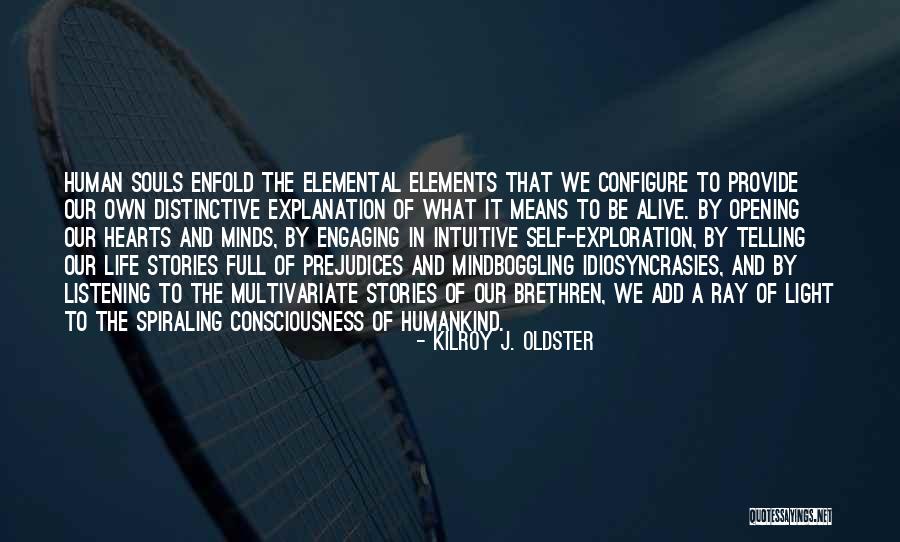
Human souls enfold the elemental elements that we configure to provide our own distinctive explanation of what it means to be alive. By opening our hearts and minds, by engaging in intuitive self-exploration, by telling our life stories full of prejudices and mindboggling idiosyncrasies, and by listening to the multivariate stories of our brethren, we add a ray of light to the spiraling consciousness of humankind. — Kilroy J. Oldster
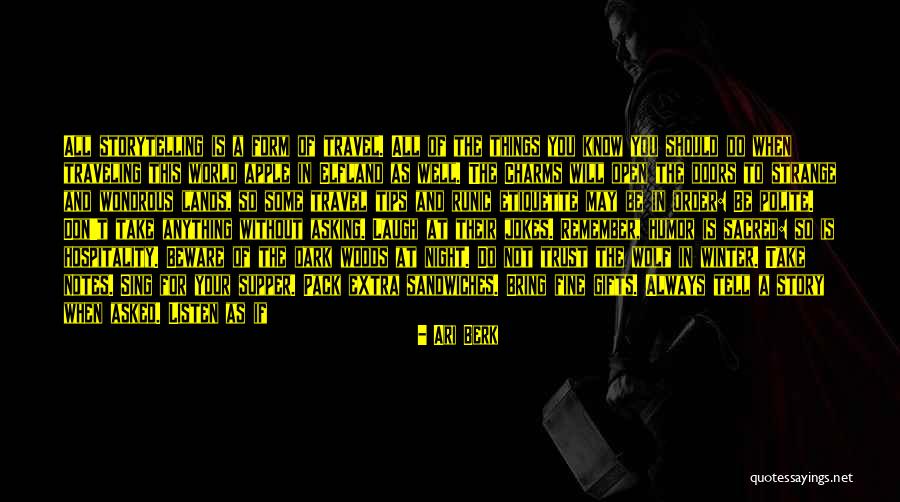
All storytelling is a form of travel. All of the things you know you should do when traveling this world apple in Elfland as well. The Charms will open the doors to strange and wondrous lands, so some travel tips and runic etiquette may be in order: Be polite. Don't take anything without asking. Laugh at their jokes. Remember, humor is sacred: so is hospitality. Beware of the dark woods at night. Do not trust the wolf in winter. Take notes. Sing for your supper. Pack extra sandwiches. Bring fine gifts. Always tell a story when asked. Listen as if your life depended on it. Start early. Walk the land. Keep your eyes open. Travel wisely and well. Come back safe and sound. — Ari Berk
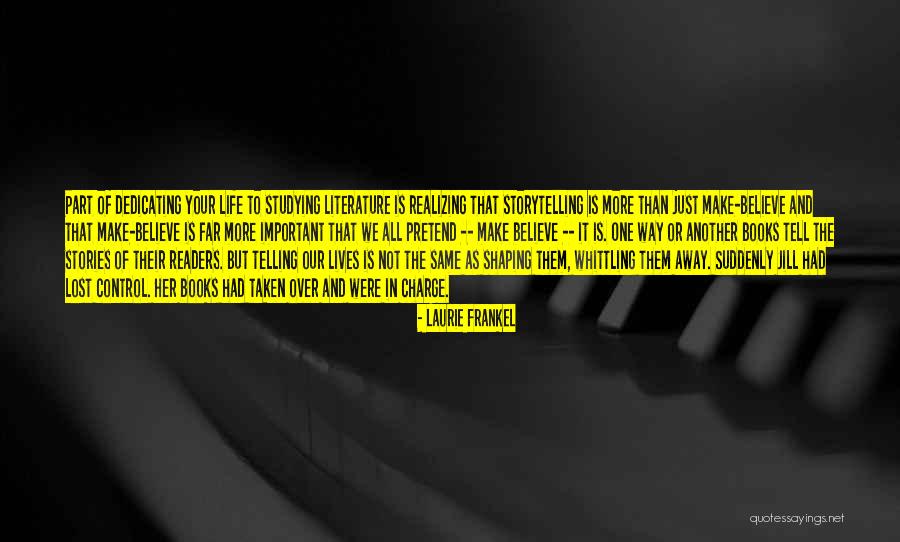
Part of dedicating your life to studying literature is realizing that storytelling is more than just make-believe and that make-believe is far more important that we all pretend -- make believe -- it is. One way or another books tell the stories of their readers. But telling our lives is not the same as shaping them, whittling them away. Suddenly Jill had lost control. Her books had taken over and were in charge. — Laurie Frankel
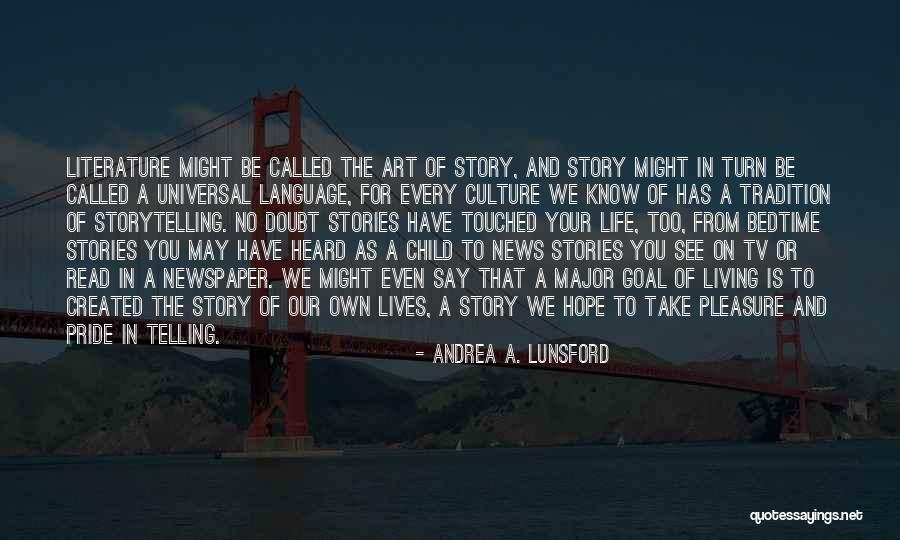
Literature might be called the art of story, and story might in turn be called a universal language, for every culture we know of has a tradition of storytelling. No doubt stories have touched your life, too, from bedtime stories you may have heard as a child to news stories you see on TV or read in a newspaper. We might even say that a major goal of living is to created the story of our own lives, a story we hope to take pleasure and pride in telling. — Andrea A. Lunsford
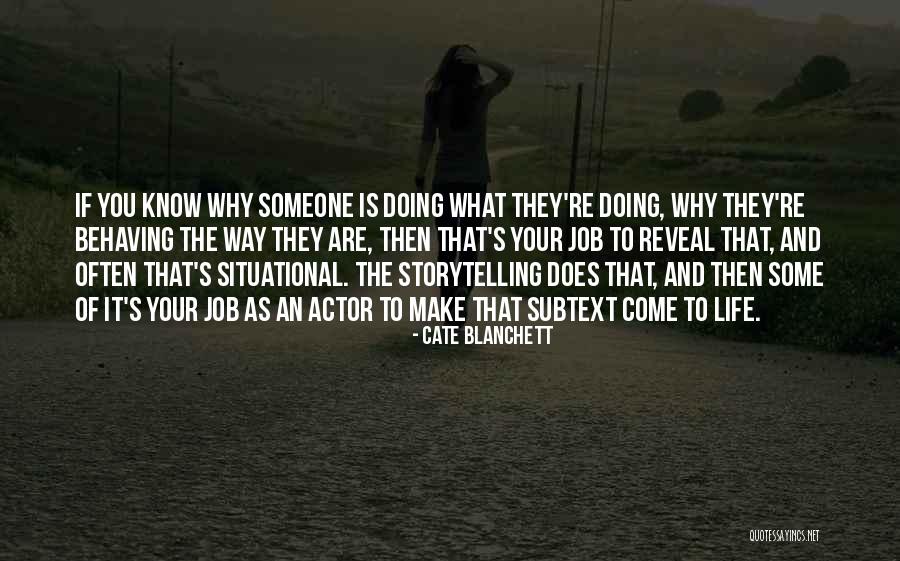
If you know why someone is doing what they're doing, why they're behaving the way they are, then that's your job to reveal that, and often that's situational. The storytelling does that, and then some of it's your job as an actor to make that subtext come to life. — Cate Blanchett
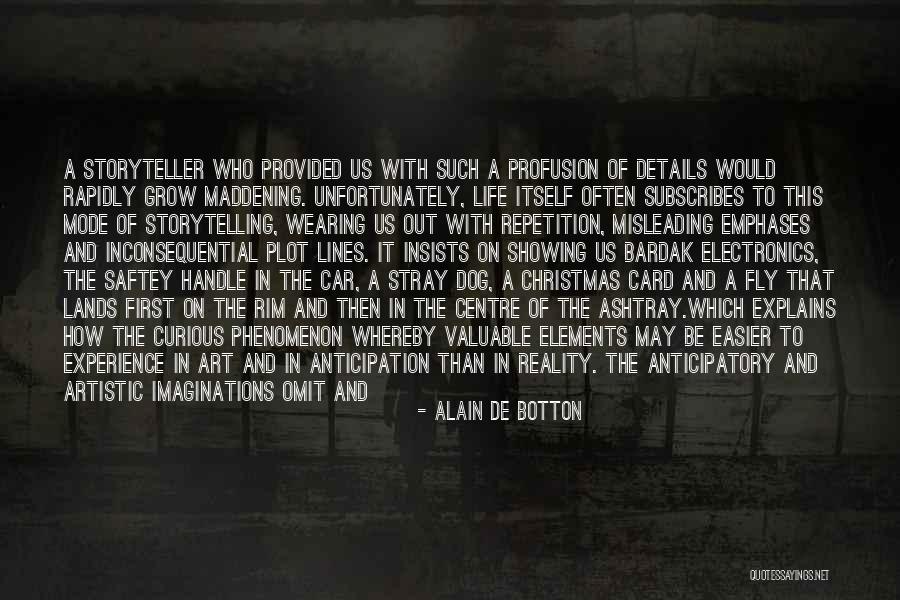
A storyteller who provided us with such a profusion of details would rapidly grow maddening. Unfortunately, life itself often subscribes to this mode of storytelling, wearing us out with repetition, misleading emphases and inconsequential plot lines. It insists on showing us Bardak Electronics, the saftey handle in the car, a stray dog, a Christmas card and a fly that lands first on the rim and then in the centre of the ashtray.
Which explains how the curious phenomenon whereby valuable elements may be easier to experience in art and in anticipation than in reality. The anticipatory and artistic imaginations omit and compress; they cut away the periods of boredom and direct our attention to critical moments, and thus, without either lying or embellishing, they lend to life a vividness and a coherence that it may lack in the distracting wooliness of the present. — Alain De Botton
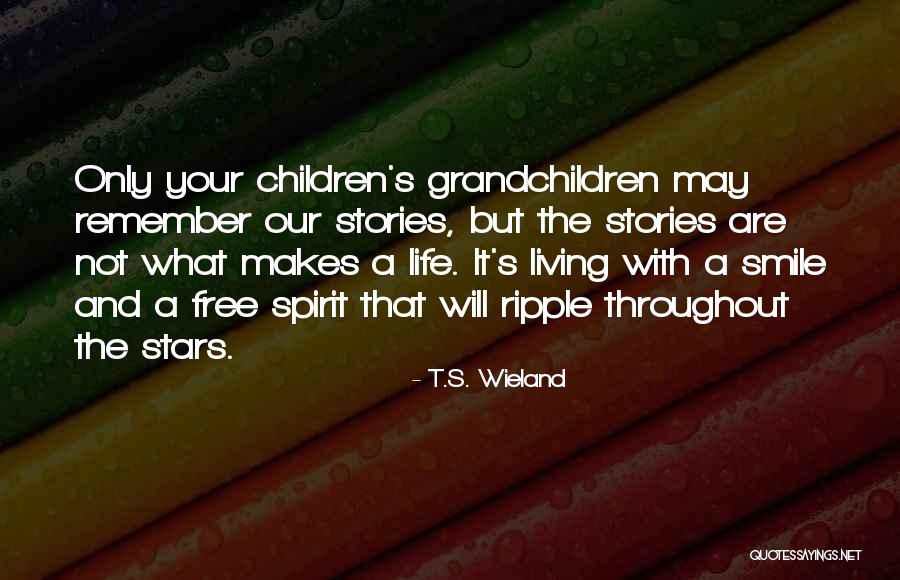
Only your children's grandchildren may remember our stories, but the stories are not what makes a life. It's living with a smile and a free spirit that will ripple throughout the stars. — T.S. Wieland
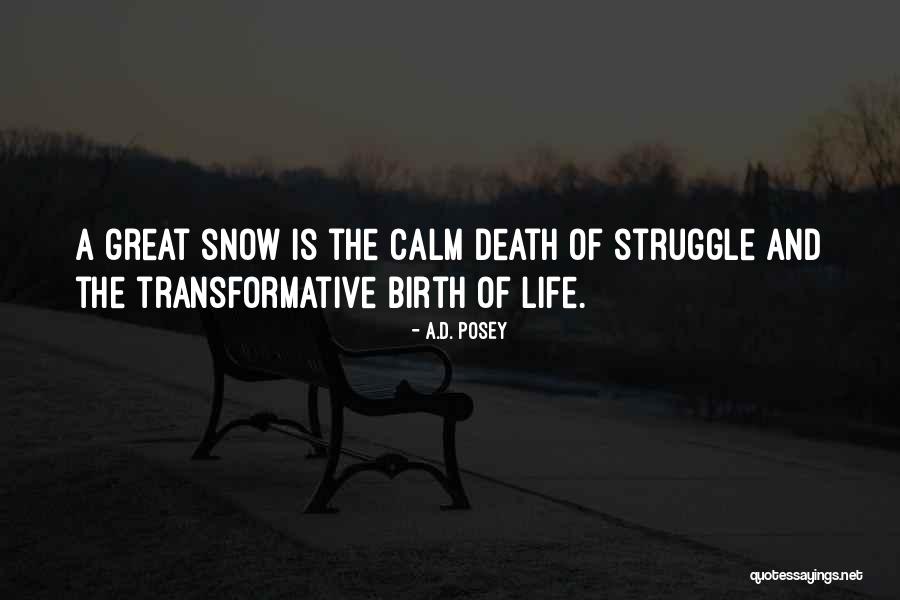
A great snow is the calm death of struggle and the transformative birth of life. — A.D. Posey
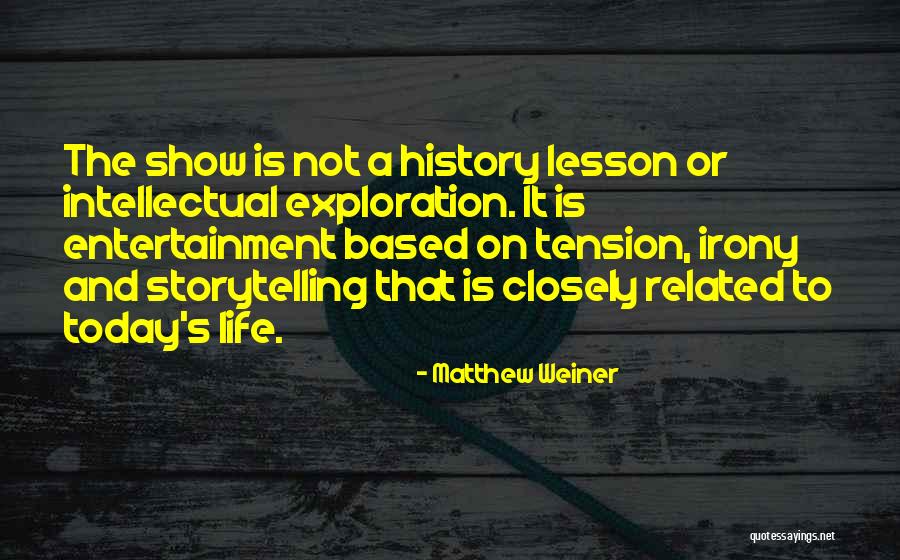
The show is not a history lesson or intellectual exploration. It is entertainment based on tension, irony and storytelling that is closely related to today's life. — Matthew Weiner
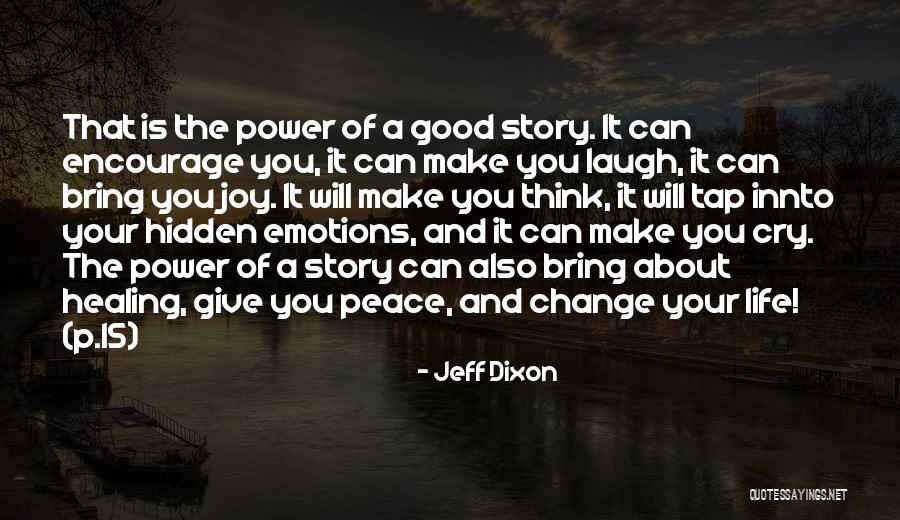
That is the power of a good story. It can encourage you, it can make you laugh, it can bring you joy. It will make you think, it will tap innto your hidden emotions, and it can make you cry. The power of a story can also bring about healing, give you peace, and change your life! (p.15) — Jeff Dixon
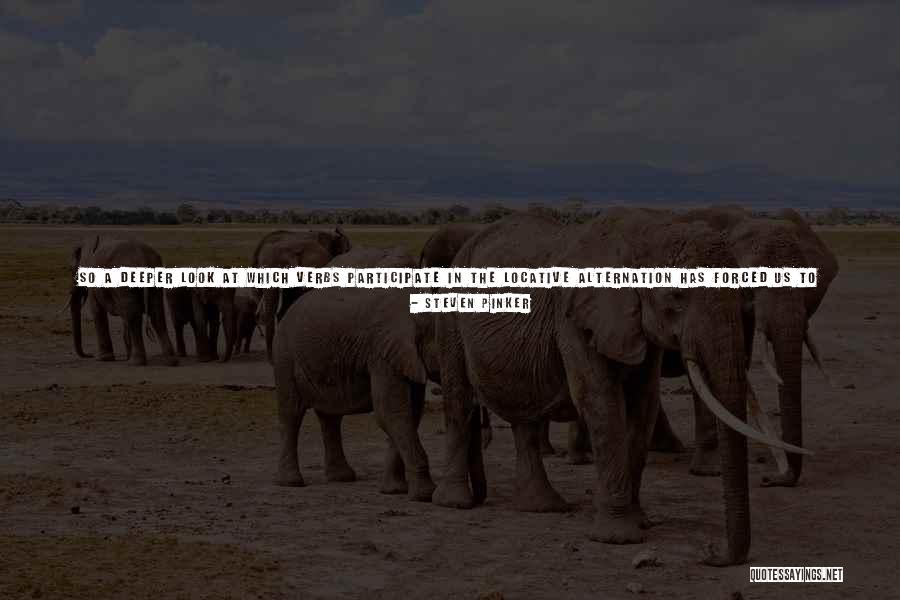
So a deeper look at which verbs participate in the locative alternation has forced us to take a deeper look at what compels the mind to construe physical events in certain ways. And at that depth we have discovered a new layer of concepts that the mind uses to organize mundane experience: concepts about substance, space, time, and force. These concepts encourage the mind to unite events that have nothing in common in terms of what they look like, smell like, or feel like, yet they obviously matter to the mind a great deal. They are so pervasive that some philosophers consider them to be the very scaffolding that organizes mental life, and in chapter 4 I will show how they saturate our science, our storytelling, our morals, our law, even our humor. — Steven Pinker
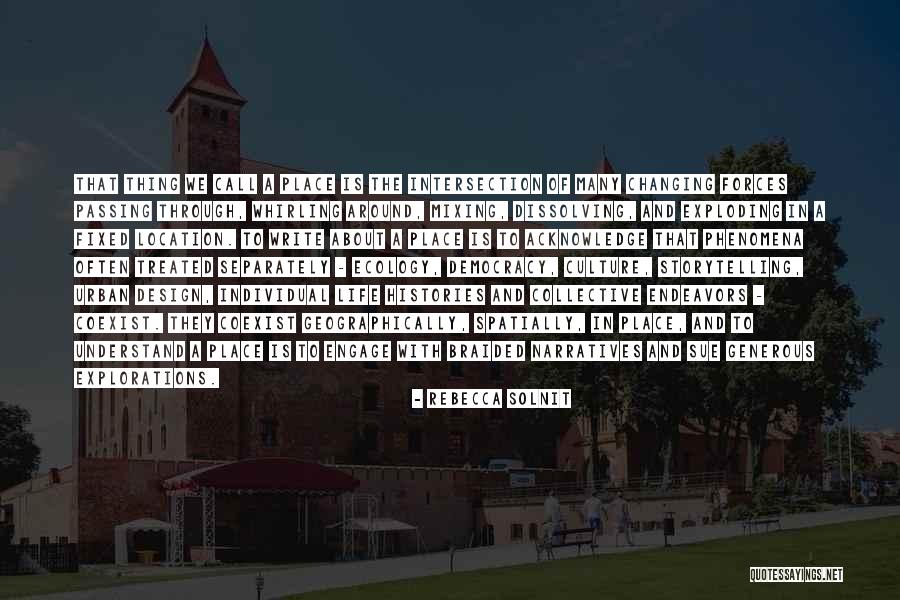
That thing we call a place is the intersection of many changing forces passing through, whirling around, mixing, dissolving, and exploding in a fixed location. To write about a place is to acknowledge that phenomena often treated separately - ecology, democracy, culture, storytelling, urban design, individual life histories and collective endeavors - coexist. They coexist geographically, spatially, in place, and to understand a place is to engage with braided narratives and sue generous explorations. — Rebecca Solnit
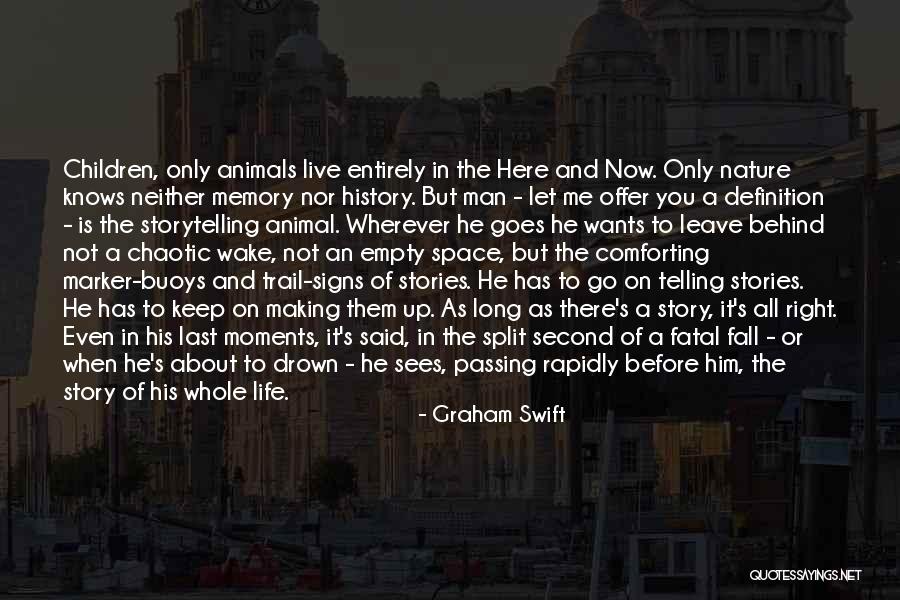
Children, only animals live entirely in the Here and Now. Only nature knows neither memory nor history. But man - let me offer you a definition - is the storytelling animal. Wherever he goes he wants to leave behind not a chaotic wake, not an empty space, but the comforting marker-buoys and trail-signs of stories. He has to go on telling stories. He has to keep on making them up. As long as there's a story, it's all right. Even in his last moments, it's said, in the split second of a fatal fall - or when he's about to drown - he sees, passing rapidly before him, the story of his whole life. — Graham Swift
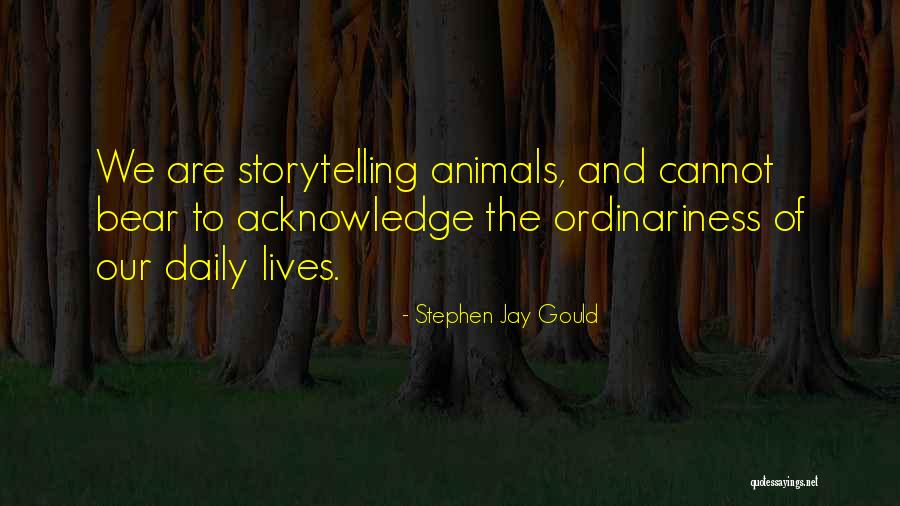
We are storytelling animals, and cannot bear to acknowledge the ordinariness of our daily lives. — Stephen Jay Gould
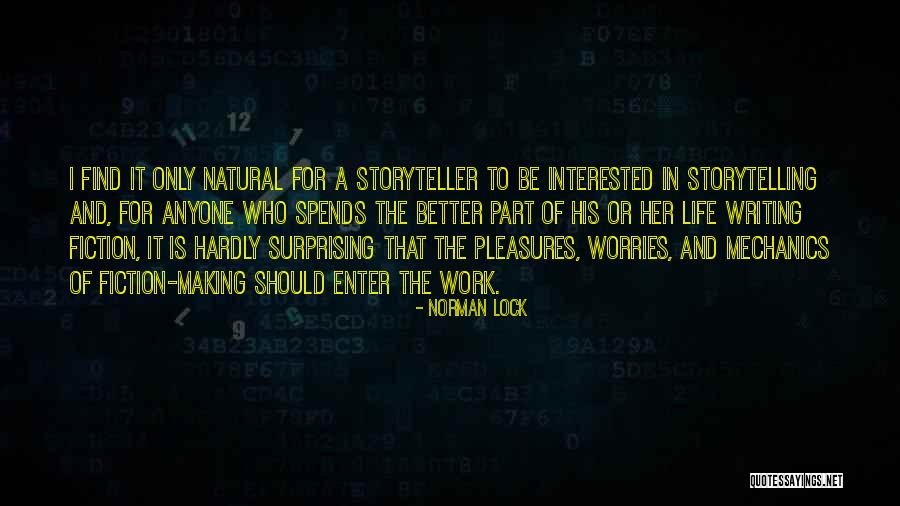
I find it only natural for a storyteller to be interested in storytelling and, for anyone who spends the better part of his or her life writing fiction, it is hardly surprising that the pleasures, worries, and mechanics of fiction-making should enter the work. — Norman Lock
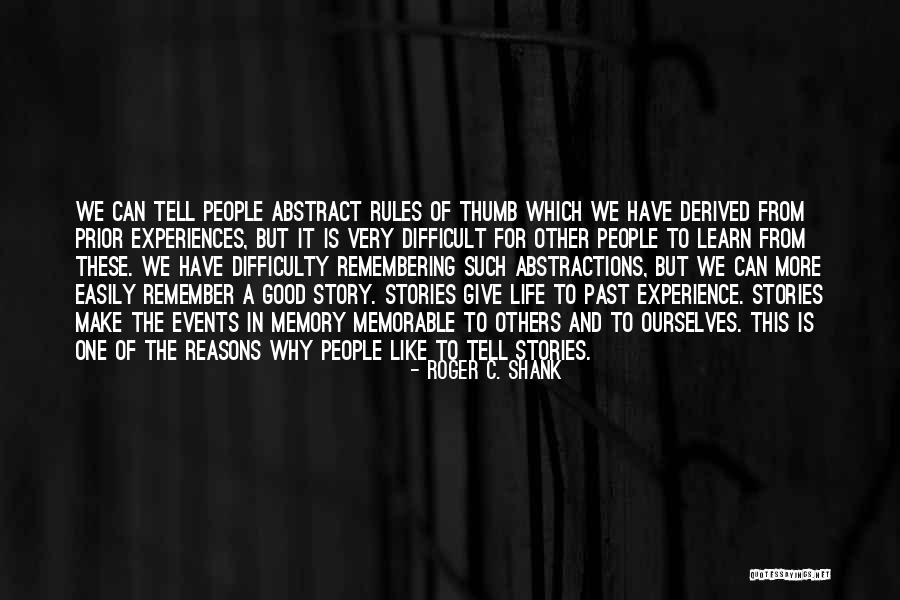
We can tell people abstract rules of thumb which we have derived from prior experiences, but it is very difficult for other people to learn from these. We have difficulty remembering such abstractions, but we can more easily remember a good story. Stories give life to past experience. Stories make the events in memory memorable to others and to ourselves. This is one of the reasons why people like to tell stories. — Roger C. Shank
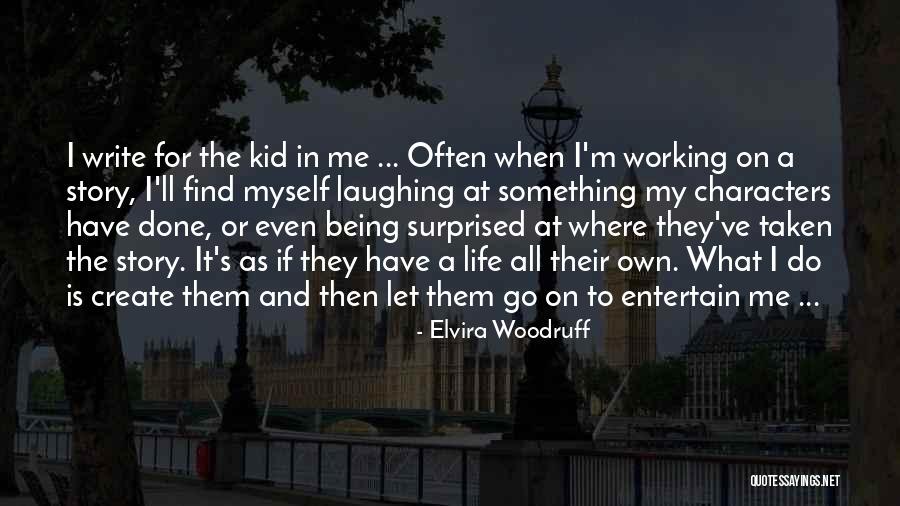
I write for the kid in me ... Often when I'm working on a story, I'll find myself laughing at something my characters have done, or even being surprised at where they've taken the story. It's as if they have a life all their own. What I do is create them and then let them go on to entertain me ... — Elvira Woodruff
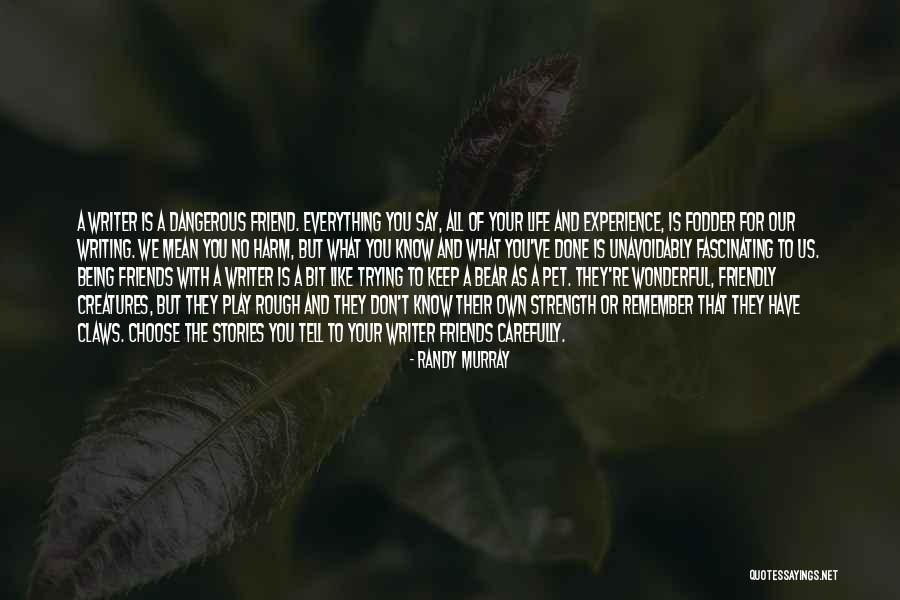
A writer is a dangerous friend. Everything you say, all of your life and experience, is fodder for our writing. We mean you no harm, but what you know and what you've done is unavoidably fascinating to us. Being friends with a writer is a bit like trying to keep a bear as a pet. They're wonderful, friendly creatures, but they play rough and they don't know their own strength or remember that they have claws. Choose the stories you tell to your writer friends carefully. — Randy Murray
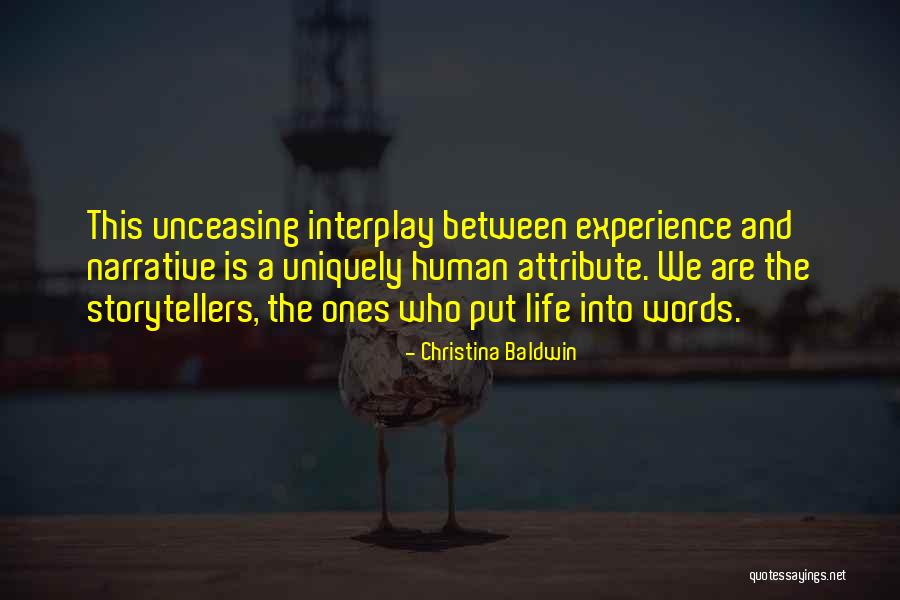
This unceasing interplay between experience and narrative is a uniquely human attribute. We are the storytellers, the ones who put life into words. — Christina Baldwin
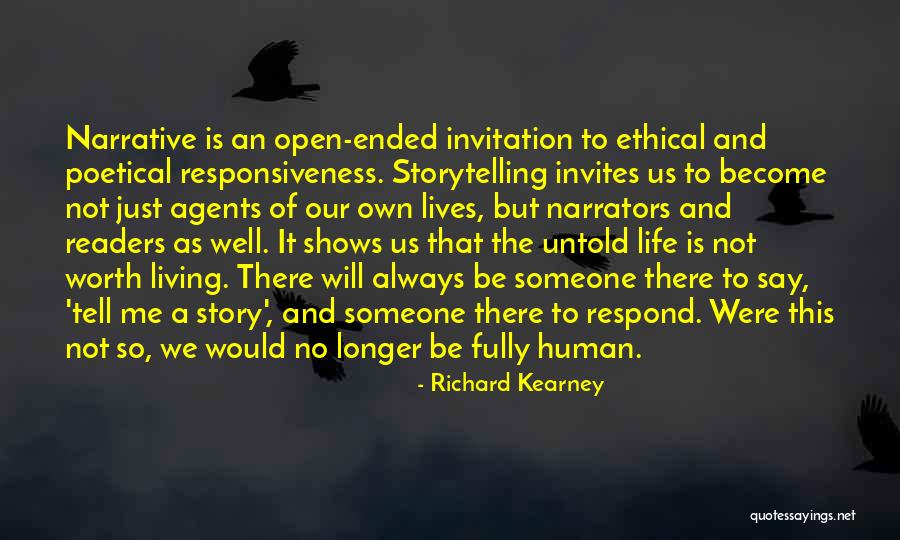
Narrative is an open-ended invitation to ethical and poetical responsiveness. Storytelling invites us to become not just agents of our own lives, but narrators and readers as well. It shows us that the untold life is not worth living.
There will always be someone there to say, 'tell me a story', and someone there to respond. Were this not so, we would no longer be fully human. — Richard Kearney
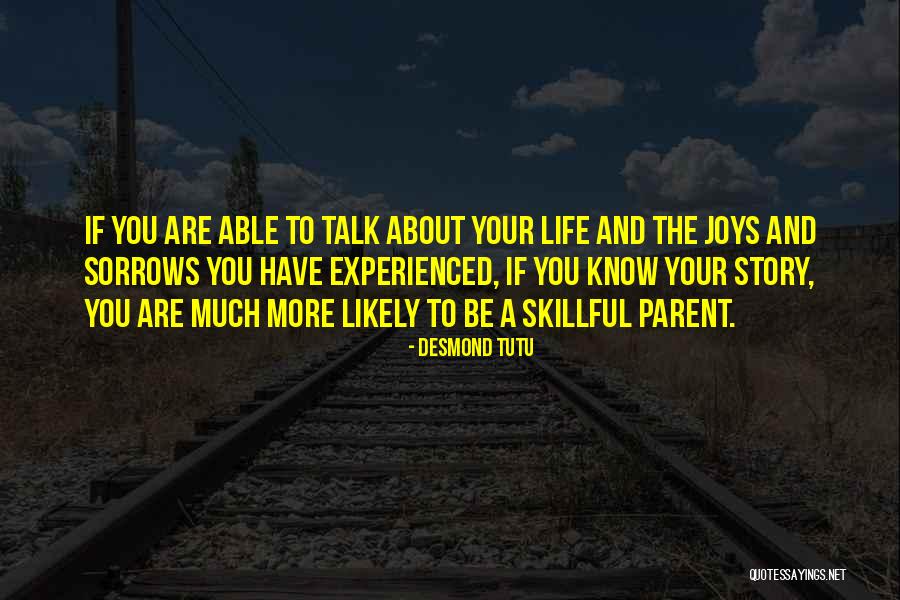
If you are able to talk about your life and the joys and sorrows you have experienced, if you know your story, you are much more likely to be a skillful parent. — Desmond Tutu
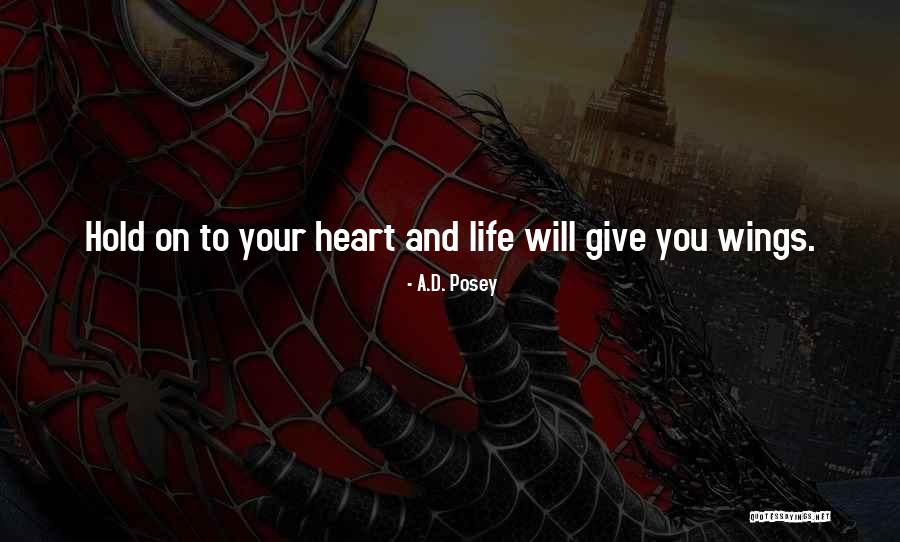
Hold on to your heart and life will give you wings. — A.D. Posey
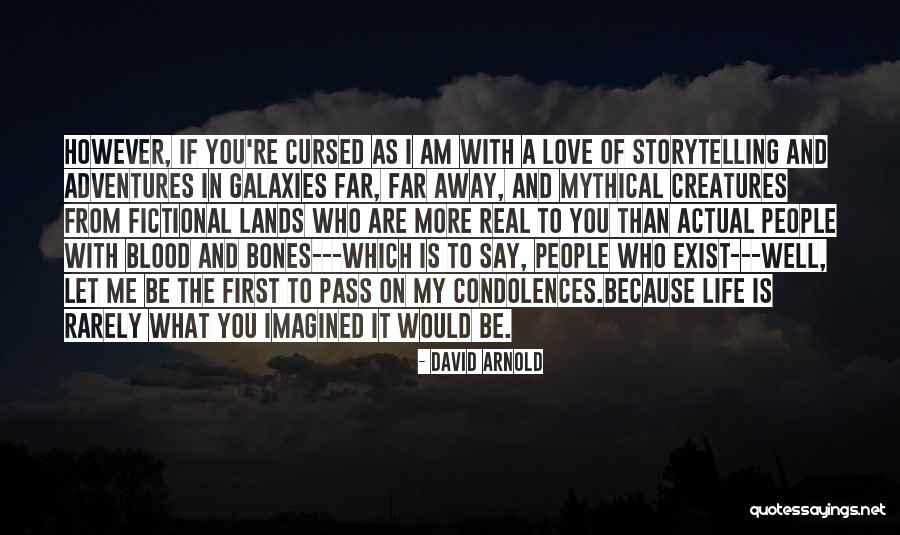
However, if you're cursed as I am with a love of storytelling and adventures in galaxies far, far away, and mythical creatures from fictional lands who are more real to you than actual people with blood and bones---which is to say, people who exist---well, let me be the first to pass on my condolences.
Because life is rarely what you imagined it would be. — David Arnold
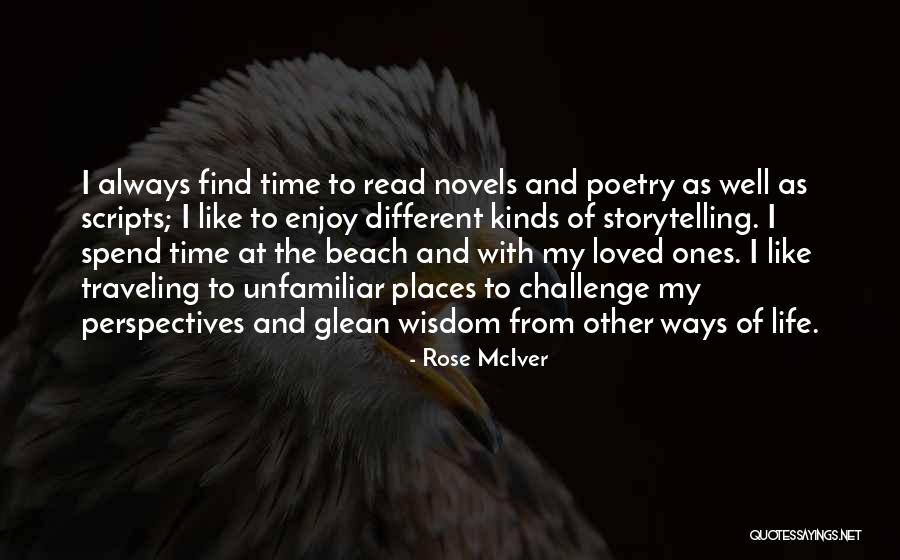
I always find time to read novels and poetry as well as scripts; I like to enjoy different kinds of storytelling. I spend time at the beach and with my loved ones. I like traveling to unfamiliar places to challenge my perspectives and glean wisdom from other ways of life. — Rose McIver
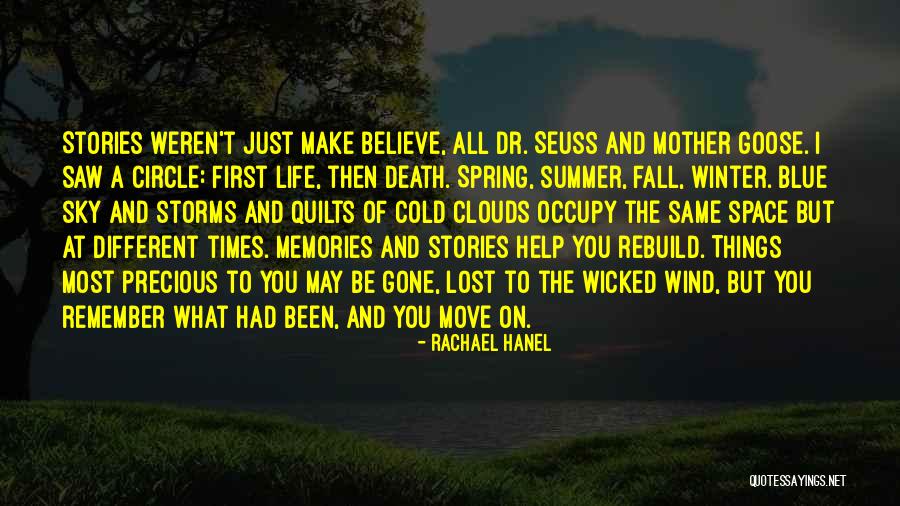
Stories weren't just make believe, all Dr. Seuss and Mother Goose. I saw a circle: first life, then death. Spring, summer, fall, winter. Blue sky and storms and quilts of cold clouds occupy the same space but at different times. Memories and stories help you rebuild. Things most precious to you may be gone, lost to the wicked wind, but you remember what had been, and you move on. — Rachael Hanel
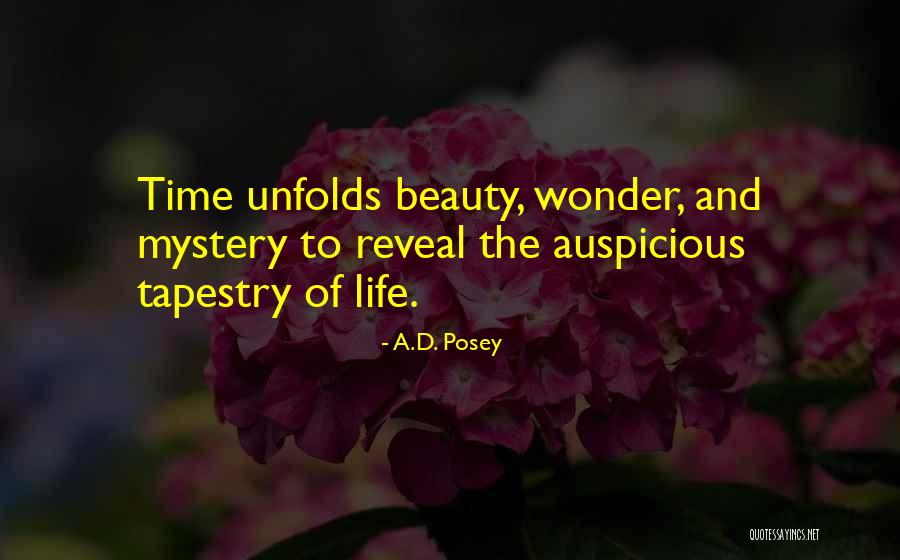
Time unfolds beauty, wonder, and mystery to reveal the auspicious tapestry of life. — A.D. Posey
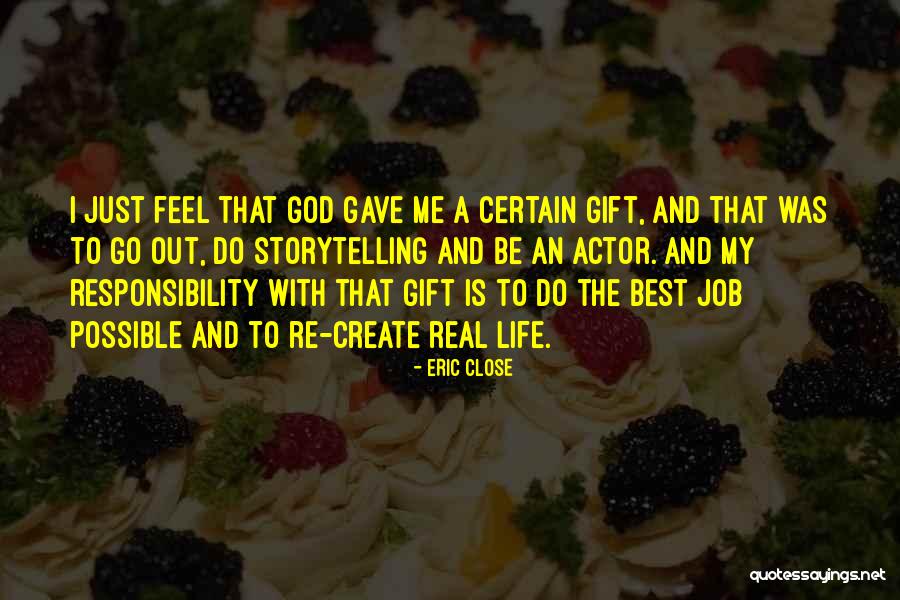
I just feel that God gave me a certain gift, and that was to go out, do storytelling and be an actor. And my responsibility with that gift is to do the best job possible and to re-create real life. — Eric Close
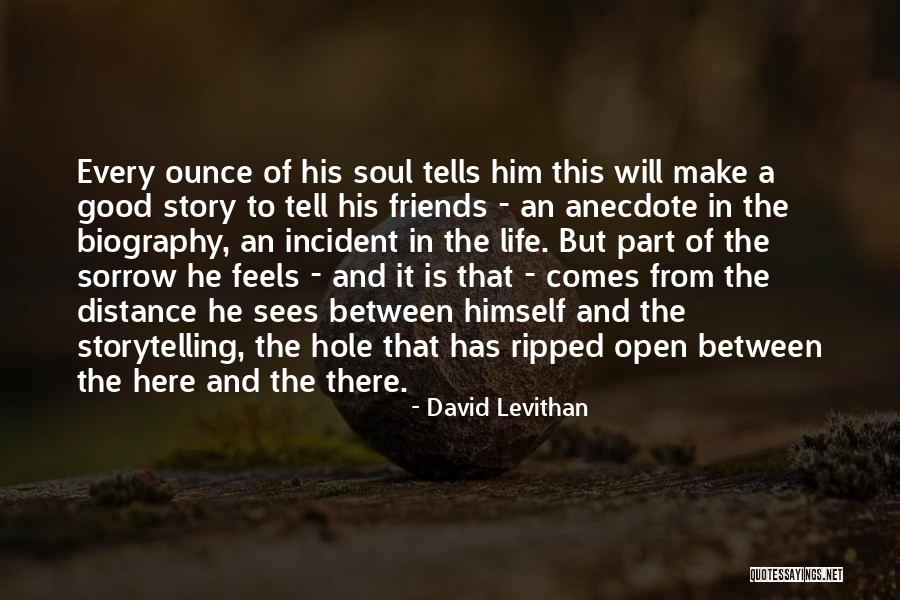
Every ounce of his soul tells him this will make a good story to tell his friends - an anecdote in the biography, an incident in the life. But part of the sorrow he feels - and it is that - comes from the distance he sees between himself and the storytelling, the hole that has ripped open between the here and the there. — David Levithan
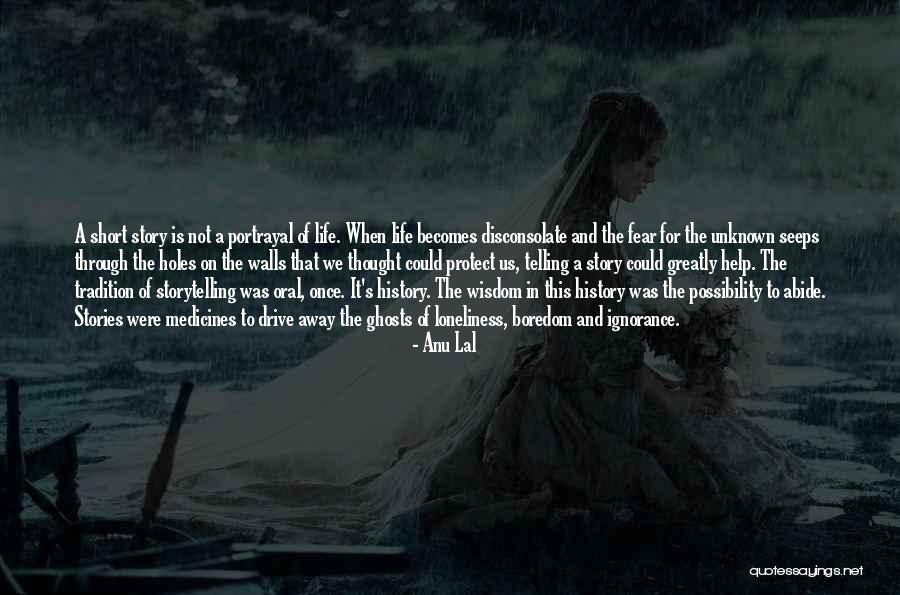
A short story is not a portrayal of life. When life becomes disconsolate and the fear for the unknown seeps through the holes on the walls that we thought could protect us, telling a story could greatly help. The tradition of storytelling was oral, once. It's history. The wisdom in this history was the possibility to abide. Stories were medicines to drive away the ghosts of loneliness, boredom and ignorance. — Anu Lal
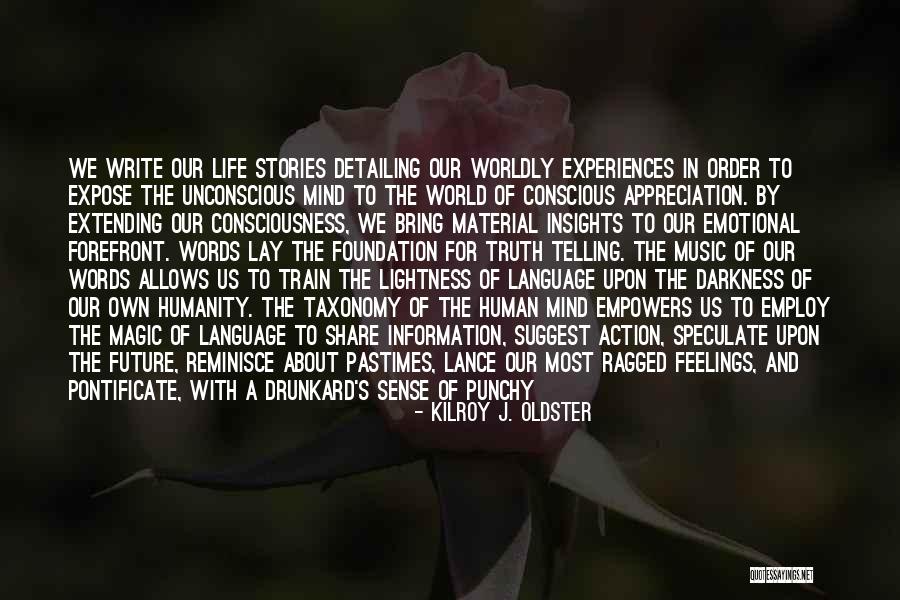
We write our life stories detailing our worldly experiences in order to expose the unconscious mind to the world of conscious appreciation. By extending our consciousness, we bring material insights to our emotional forefront. Words lay the foundation for truth telling. The music of our words allows us to train the lightness of language upon the darkness of our own humanity. The taxonomy of the human mind empowers us to employ the magic of language to share information, suggest action, speculate upon the future, reminisce about pastimes, lance our most ragged feelings, and pontificate, with a drunkard's sense of punchy assuredness, upon any topic that fits our fancy. We tell stories in order to mark our existence, to share both our triumphs and failures, and teach wisdom gained from our previous skirmishes in a convoluted world. In absence of our stories, we do not exist in our own minds or in the minds of our people. — Kilroy J. Oldster
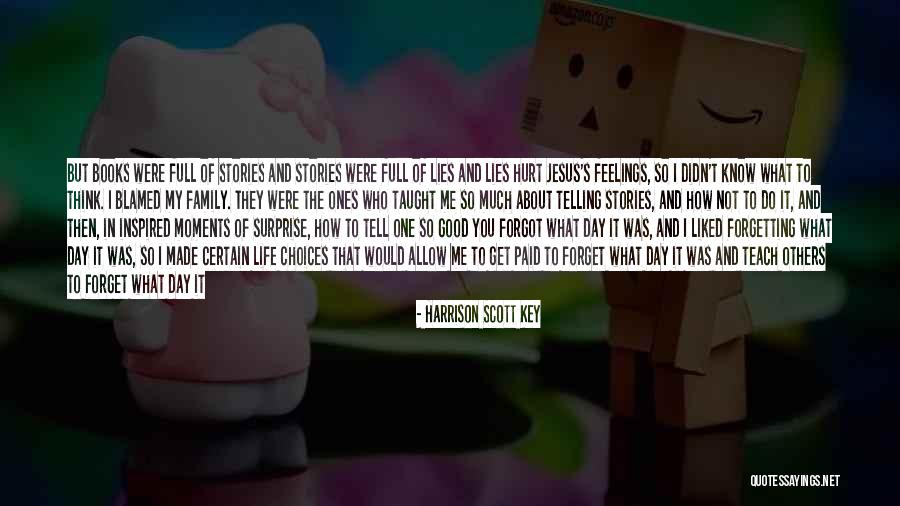
But books were full of stories and stories were full of lies and lies hurt Jesus's feelings, so I didn't know what to think. I blamed my family. They were the ones who taught me so much about telling stories, and how not to do it, and then, in inspired moments of surprise, how to tell one so good you forgot what day it was, and I liked forgetting what day it was, so I made certain life choices that would allow me to get paid to forget what day it was and teach others to forget what day it was, which is, after all, what I think heaven probably is: the whole world, forgetting what day it is. You have to, I bet, with an endless supply of them. — Harrison Scott Key
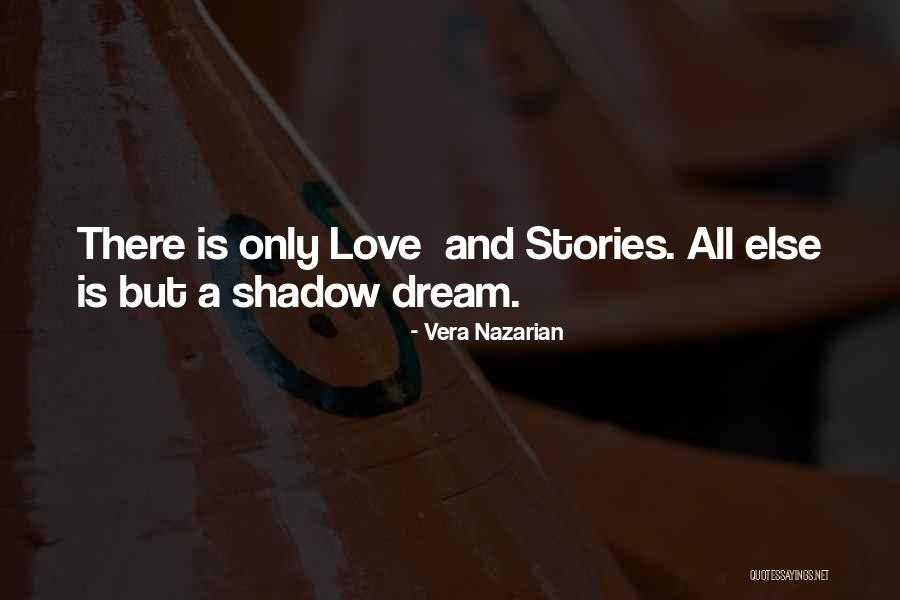
There is only Love
and Stories. All else is but a shadow dream. — Vera Nazarian
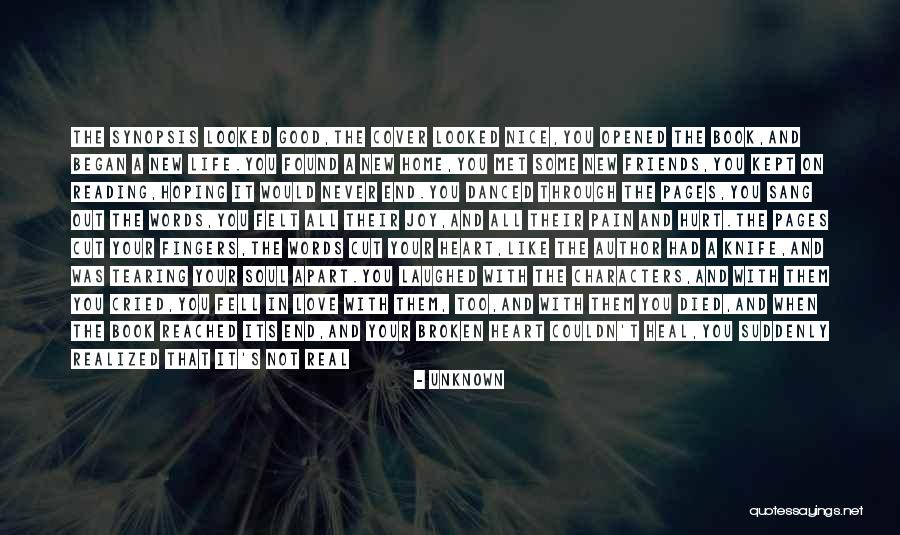
The synopsis looked good,
the cover looked nice,
you opened the book,
and began a new life.
You found a new home,
you met some new friends,
you kept on reading,
hoping it would never end.
You danced through the pages,
you sang out the words,
you felt all their joy,
and all their pain and hurt.
The pages cut your fingers,
the words cut your heart,
like the author had a knife,
and was tearing your soul apart.
You laughed with the characters,
and with them you cried,
you fell in love with them, too,
and with them you died,
and when the book reached its end,
and your broken heart couldn't heal,
you suddenly realized that
It's not real — Unknown
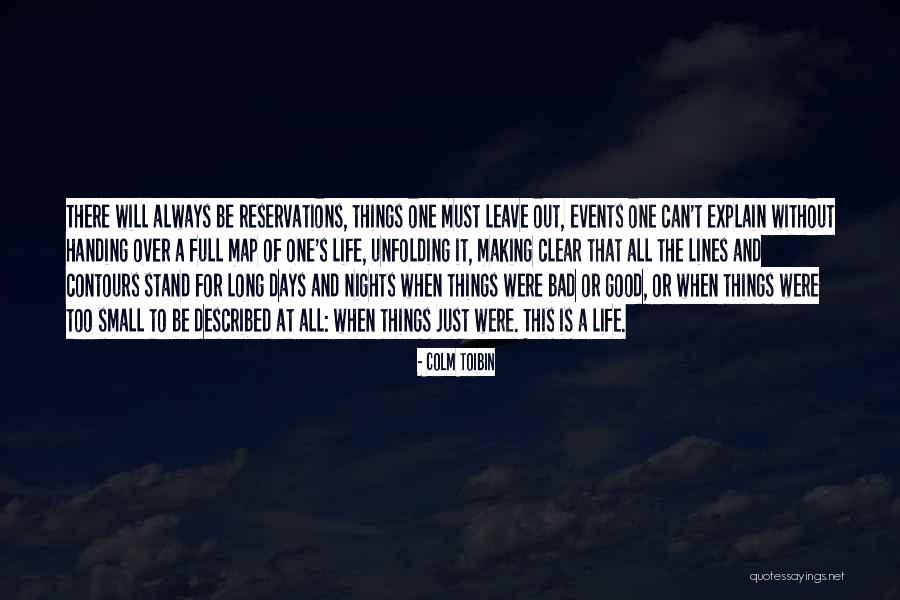
There will always be reservations, things one must leave out, events one can't explain without handing over a full map of one's life, unfolding it, making clear that all the lines and contours stand for long days and nights when things were bad or good, or when things were too small to be described at all: when things just were. This is a life. — Colm Toibin
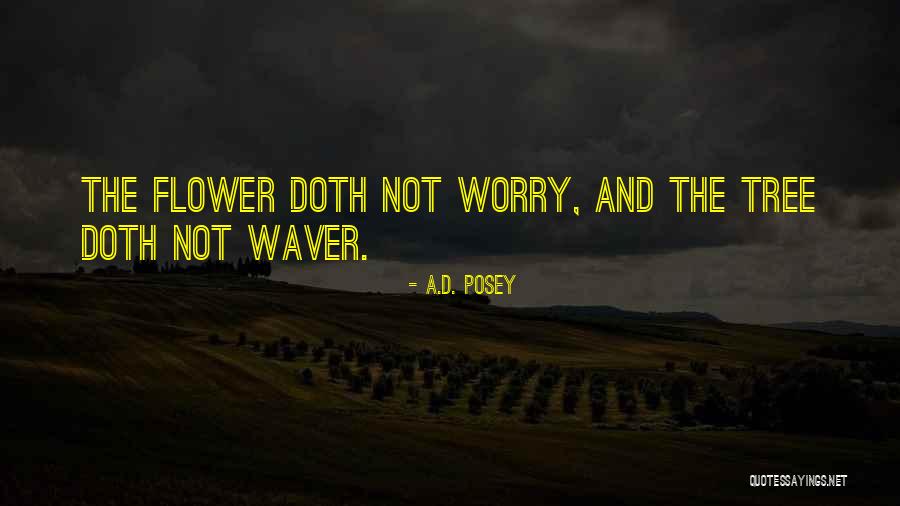
The flower doth not worry, and the tree doth not waver. — A.D. Posey
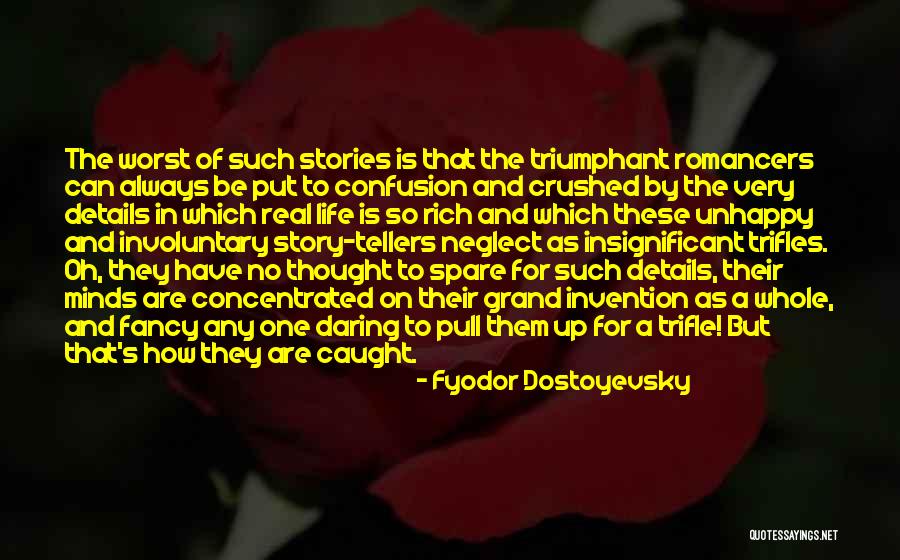
The worst of such stories is that the triumphant romancers can always be put to confusion and crushed by the very details in which real life is so rich and which these unhappy and involuntary story-tellers neglect as insignificant trifles. Oh, they have no thought to spare for such details, their minds are concentrated on their grand invention as a whole, and fancy any one daring to pull them up for a trifle! But that's how they are caught. — Fyodor Dostoyevsky
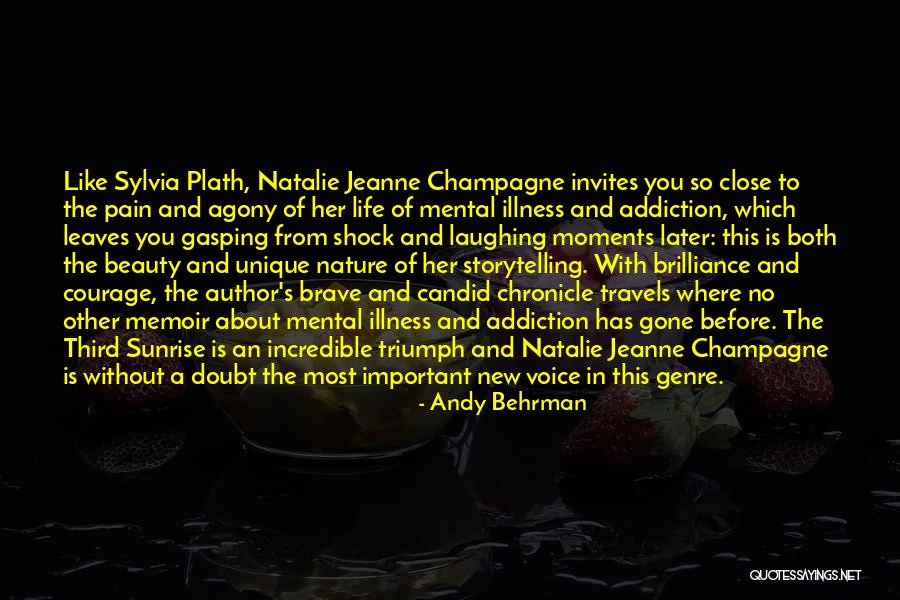
Like Sylvia Plath, Natalie Jeanne Champagne invites you so close to the pain and agony of her life of mental illness and addiction, which leaves you gasping from shock and laughing moments later: this is both the beauty and unique nature of her storytelling. With brilliance and courage, the author's brave and candid chronicle travels where no other memoir about mental illness and addiction has gone before. The Third Sunrise is an incredible triumph and Natalie Jeanne Champagne is without a doubt the most important new voice in this genre. — Andy Behrman
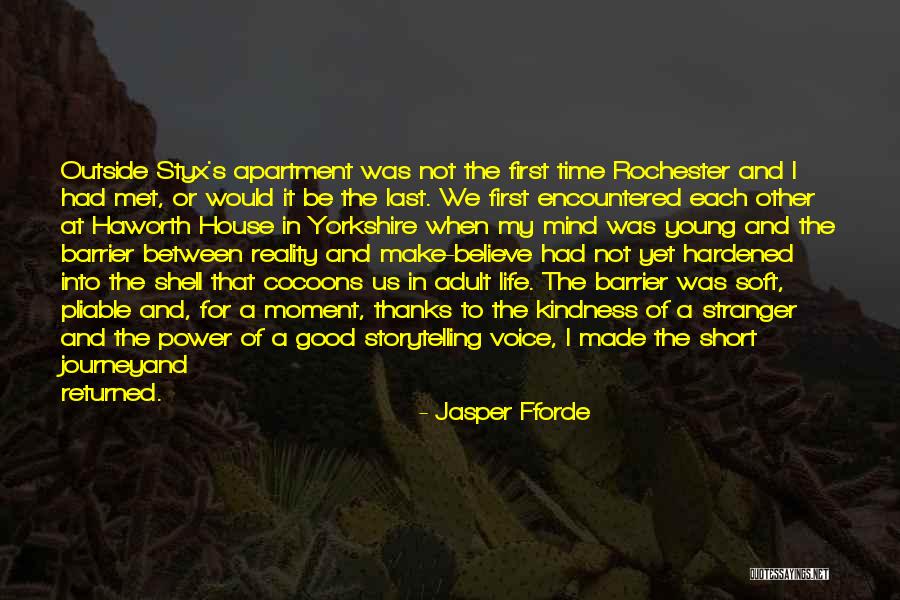
Outside Styx's apartment was not the first time Rochester and I had met, or would it be the last. We first encountered each other at Haworth House in Yorkshire when my mind was young and the barrier between reality and make-believe had not yet hardened into the shell that cocoons us in adult life. The barrier was soft, pliable and, for a moment, thanks to the kindness of a stranger and the power of a good storytelling voice, I made the short journey
and returned. — Jasper Fforde
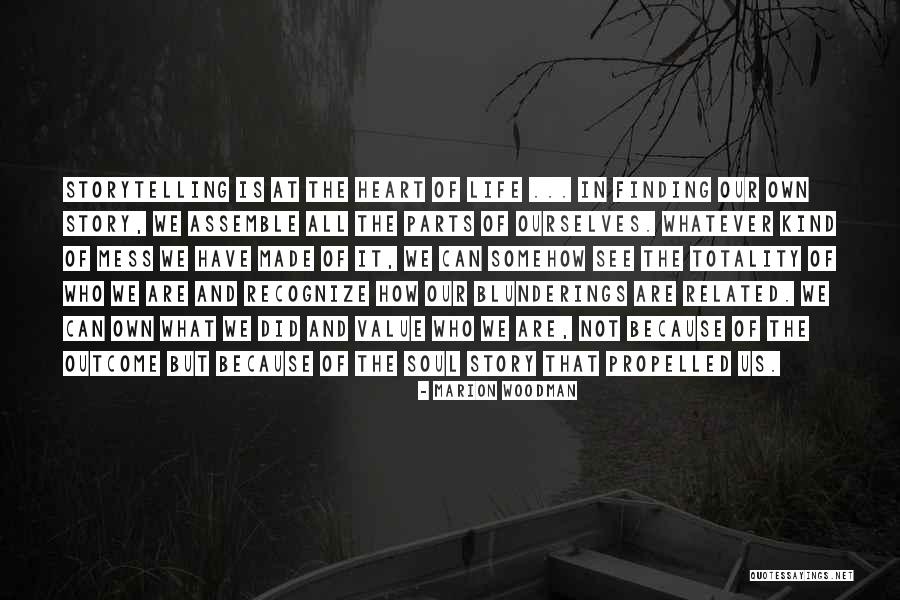
Storytelling is at the heart of life ... In finding our own story, we assemble all the parts of ourselves. Whatever kind of mess we have made of it, we can somehow see the totality of who we are and recognize how our blunderings are related. We can own what we did and value who we are, not because of the outcome but because of the soul story that propelled us. — Marion Woodman
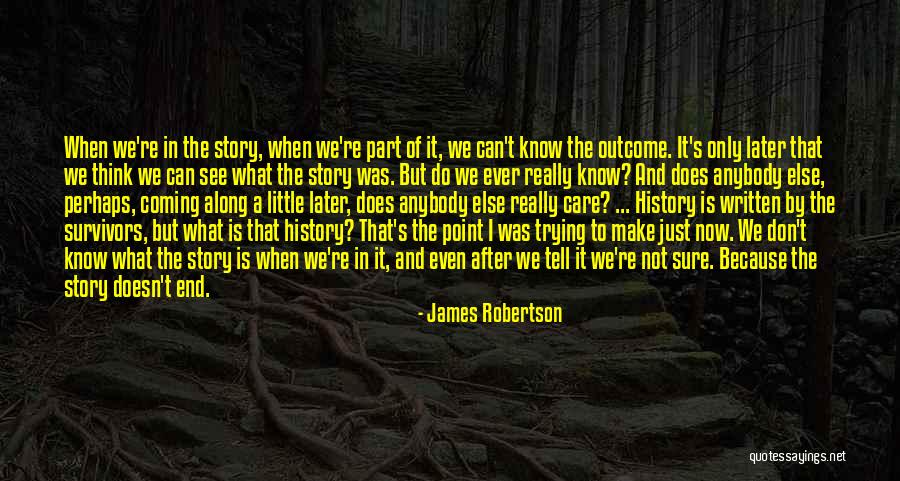
When we're in the story, when we're part of it, we can't know the outcome. It's only later that we think we can see what the story was. But do we ever really know? And does anybody else, perhaps, coming along a little later, does anybody else really care? ... History is written by the survivors, but what is that history? That's the point I was trying to make just now. We don't know what the story is when we're in it, and even after we tell it we're not sure. Because the story doesn't end. — James Robertson
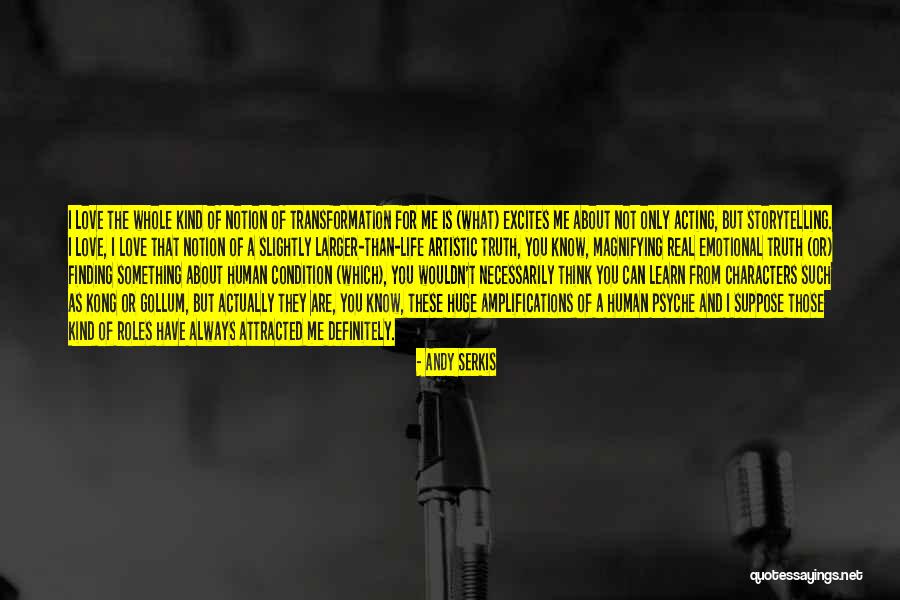
I love the whole kind of notion of transformation for me is (what) excites me about not only acting, but storytelling. I love, I love that notion of a slightly larger-than-life artistic truth, you know, magnifying real emotional truth (or) finding something about human condition (which), you wouldn't necessarily think you can learn from characters such as Kong or Gollum, but actually they are, you know, these huge amplifications of a human psyche and I suppose those kind of roles have always attracted me definitely. — Andy Serkis
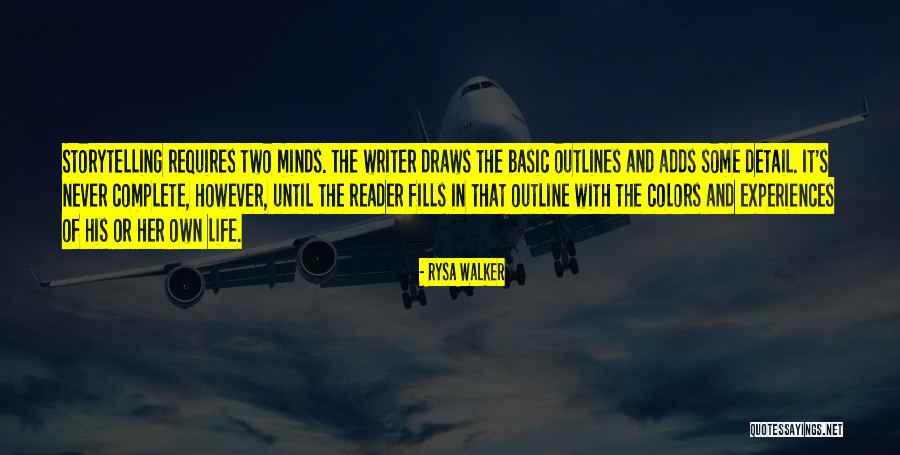
Storytelling requires two minds. The writer draws the basic outlines and adds some detail. It's never complete, however, until the reader fills in that outline with the colors and experiences of his or her own life. — Rysa Walker
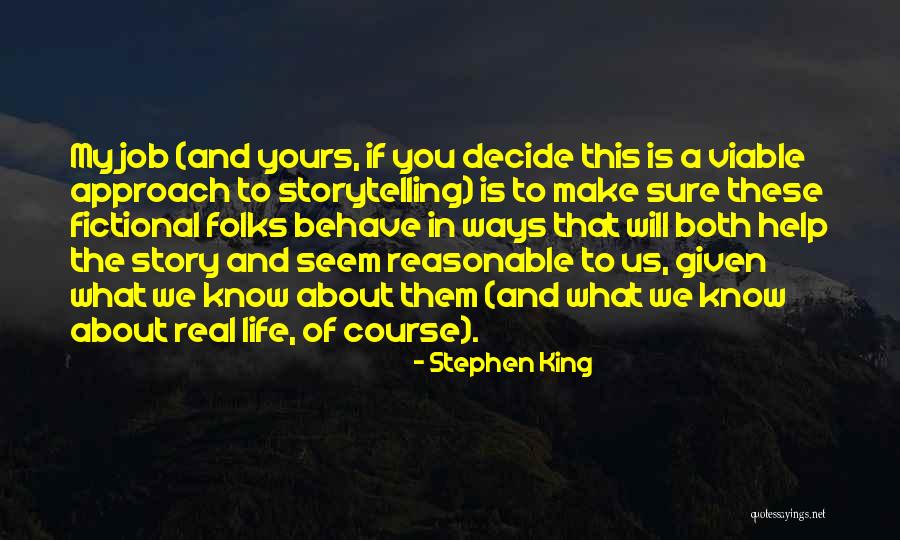
My job (and yours, if you decide this is a viable approach to storytelling) is to make sure these fictional folks behave in ways that will both help the story and seem reasonable to us, given what we know about them (and what we know about real life, of course). — Stephen King
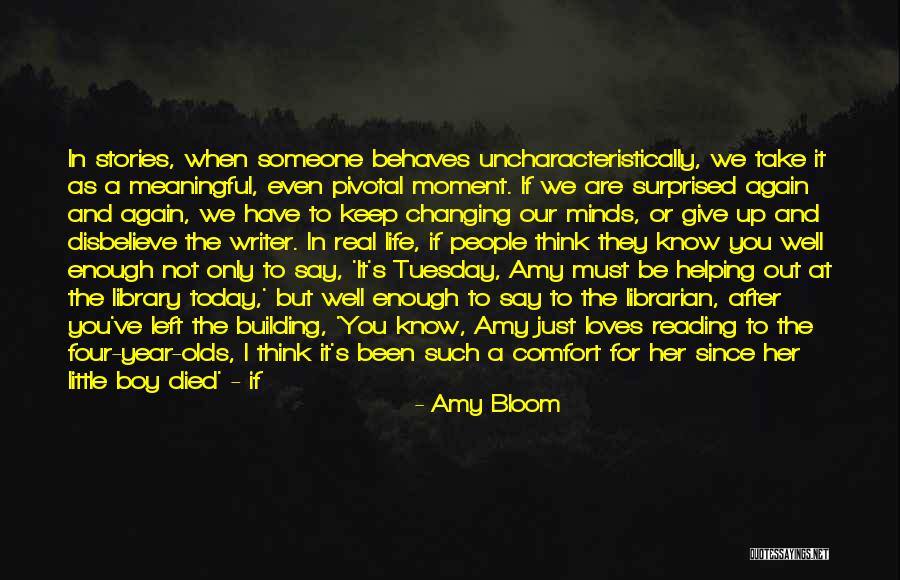
In stories, when someone behaves uncharacteristically, we take it as a meaningful, even pivotal moment. If we are surprised again and again, we have to keep changing our minds, or give up and disbelieve the writer. In real life, if people think they know you well enough not only to say, 'It's Tuesday, Amy must be helping out at the library today,' but well enough to say to the librarian, after you've left the building, 'You know, Amy just loves reading to the four-year-olds, I think it's been such a comfort for her since her little boy died' - if they know you like that, you can do almost anything where they can't see you, and when they hear about it, they will, as we do, simply disbelieve the narrator. — Amy Bloom
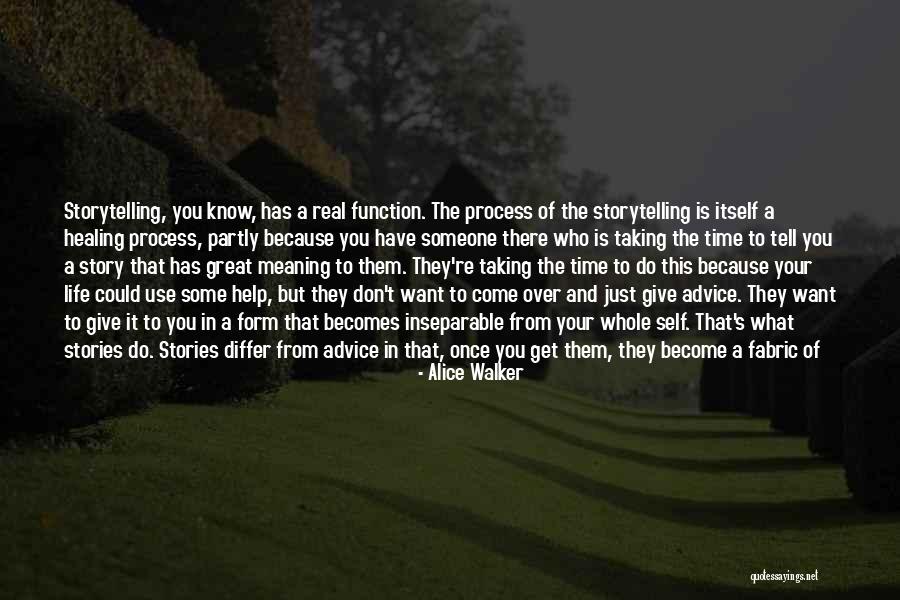
Storytelling, you know, has a real function. The process of the storytelling is itself a healing process, partly because you have someone there who is taking the time to tell you a story that has great meaning to them. They're taking the time to do this because your life could use some help, but they don't want to come over and just give advice. They want to give it to you in a form that becomes inseparable from your whole self. That's what stories do. Stories differ from advice in that, once you get them, they become a fabric of your whole soul. That is why they heal you."
~Alice Walker, in an interview about her work in Common Boundary, 1990 — Alice Walker
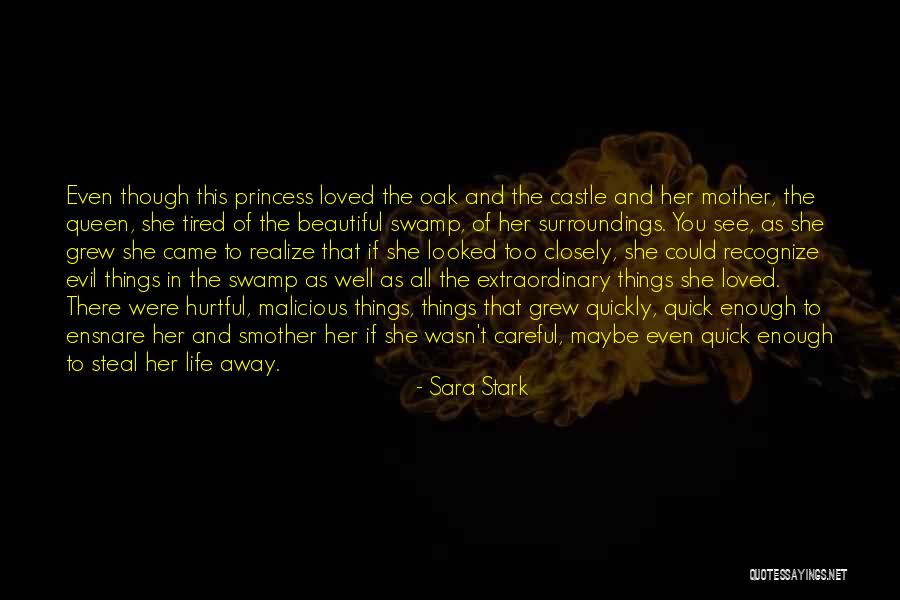
Even though this princess loved the oak and the castle and her mother, the queen, she tired of the beautiful swamp, of her surroundings. You see, as she grew she came to realize that if she looked too closely, she could recognize evil things in the swamp as well as all the extraordinary things she loved. There were hurtful, malicious things, things that grew quickly, quick enough to ensnare her and smother her if she wasn't careful, maybe even quick enough to steal her life away. — Sara Stark






